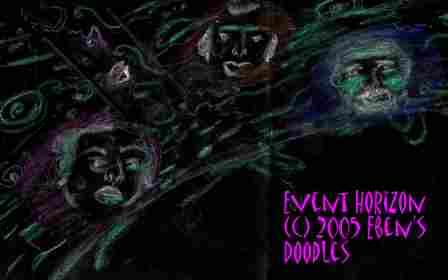

It would be understating it a bit to say much has happened since the invasion of the unsuspecting second Earth by an evil star-stone, the Alien Entity--which had been prepared for by Leo Tolstoy's bride and then given an interstellar, body-frequency-telegrammed invitation by Marty Gantry Yeager (MGY) an Irish Catholic underdog laborer in shipyards of Belfast, Ireland, that the Alien Entity could not resist.
We saw the havoc created, starting in Year of the Star 1912, and the world wars that quickly followed the sinking of the world's greatest and most luxurious ship packed with the richest people on earth.
That line of disasters culminated in the destruction of the world-government, and the Global Warming threat itself was over-turned by a new Ice Age. Retro Star had arrived and was firmly entrenched! Nations and culture and technology were sent backwards. Lost Atlantis was refound by the Alien Entity, revived, and re-created with long-buried Eastern civilizations (not to mention the Roman Empire).
The first Alien Entity, the red Carnelian, was rebuffed by Joseph II and sent out of the Second Universe, invited to Earth I unwittingly by a boy genius who had a big brain but no heart.
Sinking backwards continually, due to the invasion of the Alien Entity's siblings--nine other malicious, twisted, evil star-stones of great power and intelligence--Earth II nearly witnesses a second crucifixion of Yeshua of Nazareth. After the collapse of the neo-Roman empire that sought to save itself by putting him on the cross, the planet plunged ever deeper into darkness, the Dark Age itself.
Fortunately, Daniyel, a Jewish prophet and chancellor in Babelen, the chief metropolis of the East, crosses over from his time to the Dark Age. Here he is enlisted by the Opposing Player to set up a special training camp for the Alphabetic Champions, the Lettermen of the Most High God whom he serves. These are the knights of the Dire Night, the DUBESOR immortals. One after the other of the star-stones are defeated and either destroyed or sent fleeing by these unlikely and often underdog champions of humanity trained by the great Daniyel to overcome their various shortcomings and turn them to Olympic gold.
Earth II, thanks to Joseph II and now Daniyel's DUBESOR alphabetic champions, begins a slow revival, developing again, not retrogressing. We see the painful climb back to higher levels of technology and progress. Yet the star-stones continue to afflict humanity, threatening Earth II's progress and its very existence in the times of Homer, when the world's greatest nations (of North America and Atlantis II) are nuclear-armed and locked in a deadly Cold War.
Homer, seeking his biological father and his very identity, falls into the very vortex of the geopolitical power games being played by the major rivals on the world scene. This ends badly, as he discovers he is the son not of a human being but of an Atlantean whose own cosmic, non-human power struggle has been transplanted to Earth's human societies and nations. The internecine struggle his father was fighting in his own Atlantean society has fatally contaminated the earth, which already had many vendettas and fratracidal conflicts going on without his contribution. His interference, however, provided the spark for the powder keg, the flashpoint for mutual annihilation. The nuclear missiles everyone dreads are finally given the fatal push of the red button.
Earth II once again descends toward chaos and darkness. The 20th-21st-century-type nations are either wiped out entirely, or are replaced by mostly indigenous Indian societies and tribes. The lone exception is the archaic, anachronistic Kolumbian Empire--always an outpost of civilization , its very primitiveness and rigid theocratic Ismanic regime have worked to keep it from giving up the ghost along with more advanced nations. Hermetic, suspicious of foreigners, and hostile to change and new influences, the "empire" survives the worst, because not even nuclear warfare could sink it below the level where it had always been.
Quinn the One-Legged, the Bluebird, the Five Stars, is the Shoshone-Lakotan alphabetic champion for this time. He confronts the world system made from falsehoods, religious bigotry and fanaticism, which has driven out compassion, truth, and true humanity.
Where will Earth II go now, when Quinn's life is over? Wally, who was the free-roving representative (NTM for "non-tethered mode") for Dr. Pikkard, the maverick Dutch-American scientist, created the wargame that held possibilities for training and arming human champions to identify and defeat the invading Alien Enties, but he in turn created his own retirement scenario--the Cybernauts' Quest of the Golden Fleece.
The Harrowing of the star-stones from Earth II is now almost complete. Only one Alien Entity, remains at large--the Carbuncle, the blue-glowing Star-Stone of Faith, which was contaminated by its Keeper in heaven, known once as Lucifer, the Light Bringer. After losing the fight to take over heaven, the usurping archangel becomes anything but a Light Bringer on Earth I, which somehow refuses to believe he even exists, though he runs the world system for thousands of years--injecting the same twisted values and pride and selfishness that had orginally polluted heaven and the Stones of Fire.
While the Alpha Centauri colony struggles on for almost a million years, essentially lost in space, unable to find an Earth that will take their recolonization until their discovery and theatrical presentations of of Sulkowsky's painted archives, Wally's endgame in the Cyberworld of Kastorr plays fast forward, with fifty Cybernauts chosen from Tutasix's genotype library archives in Atka, Alaska, a facility left over from the shattered Crystal Age headed by Dr. Chillingsworth that ended in 2170.
Having no consciousness of the Carbuncle, yet the struggles and defeats and triumphs of the Fifty as they are fought by their opposing players on the Black Ship in this zero-sum game are inextricably, vitally intertwined with the objective not only of Dr. Pikkard's five-millenia-long Endgame but the destinies of Earths I and II--a much larger picture that not even Dr. Pikkard could have envisioned, and, before him, the Lakotan Chroniclers, Gabriel Tall Chief, and his cousin Horace Brave Scout. Someone wise once said "The sum is greater than its parts", and it remains a true saying. Will the long separated Twins, Earths I and II, pictured among the stars in Enoch's visions, as the twin brothers Castor and Pollux, be reunited? It remains to be seen, and to a large part the outcome depends on Wally's retirement cruise, the Cyber-World quest of the heavenly Ram's golden fleece.

Captain Pikkard's choice catapulted them out of the vise of the vampires and the Black Ship and landed them safely at their next port of call: the Emerald City.
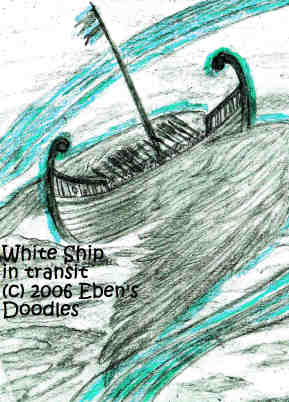
Was this a good place to land, or not? Time would tell. Even in its silent, seemingly deserted state, the metropolis interested the crew, who thought they had at least a couple days here before the Black Ship caught up with them. Was it here the Golden Fleece was to be found? Was this Colchis? Would they be first after all to reach the prize? How could they know one way or the other unless they went ashore?
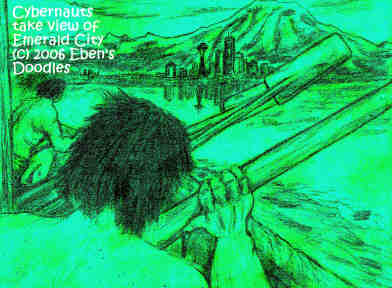
The wings had dropped off as before, so they oared the rest of the way in between the moored ships of the crowded but silent port.
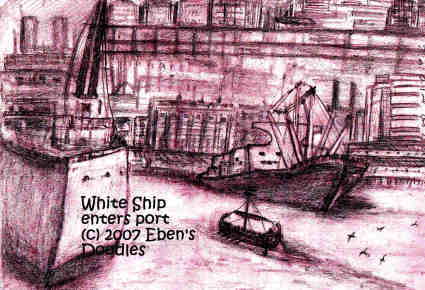
How the Emerald City acquired that odd name, who could say? There had never been emerald mines in the area. Why did the city pick that name? It had no inhabitants, they would soon discover, who could tell them. Of if Wally had provided any, they were certainly not in sight. The Emerald, before it was contaminated, has been a fiery stone in heaven, known for foresight, perception, perspective, and truth. Fallen, the star-stone promoted only blindness, twisted viewpoints, and falsehood. Did the inhabitants of the Emerald City know what they had chosen to be their shining star?
Given three days shore leave, the fifty Cybernauts fanned out, to take a look at whatever caught their eye. Though the two women decided to look for curtains and other household items to brighten up the rough, sailcloth tent the captain had erected on board for their privacy, the men were more in a mind for some adventure. Some climbed the steep hills, others went up to the salmon locks between Lake Union and the Sound. They got in some good fishing there, as the salmon runs were back to pre-settlement numbers and the seals couldn't possibly cut their numbers significantly. Others toured the museum of flight--which was in walking distance of the port.
Ero, trained to run alone, left his autoharp on board and took off, without a backward glance at Horace, who followed more slowly at a distance. Horace the butterfly scout wasn't interested in art and sculpture, salmon, or the tall buildings. He was a lookout--always on the watch for trouble up ahead, such as reefs, icebergs (though the Sound, north and south, was too warm for them), and enemy ships.
Taking a staircase down, Ero found himself in an underground city, that had been buried in the 19th century when the city moved two or more levels up from the soggy sawdust foundations of the logging mills and tidewater business district.

Here the lighting, thanks to Wally, was good enough to see all he wanted before he climbed back to the 20th century street level. Taverns, bordellos, Chinese gambling houses, dance halls, pool parlors, livery stables, dry goods shops and gold rush miner outfitters, assayer's offices, shippers' officers, rooms to rent, barber shops, clam chowder houses, haberdashers, blacksmiths, jails, Chinese laundries, sea level latrines with tide charts, cobblers, more Chinese laundries, pawnshops, tanners, warehouses, docks, a lone Salvation Army feeding station in a converted Chinese laundry--they were all there, abandoned but mostly intact, even with unsold items left in the stores and windows as if the proprieter were still hoping for a late sale.
Were there any people living in the huge maze? he wondered. Then he heard a gasp and found a surprised beggar gazing down at him--not just a beggar but the unelected mayor of the underground. The sidewalk window grate above, missing some colored blocks of glass to allow the light through to the next level, let both Ero and the mayor get a good look at each other before the mayor scurried off--not liking the sight of a stranger popping up on him like that.
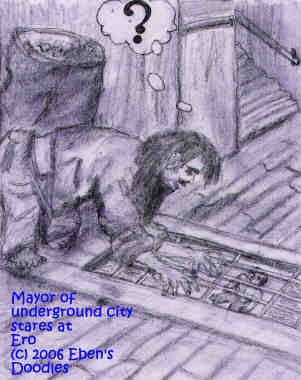
Going down a blind alley, he left by a doorway and found himself in a narrow entryway, then was faced with a staircase, which led to a brick wall. Going back he noticed a window was open on a wall, and climbed through it. It put him in what looked like a storage room, with barrels of salt pork, sacks of potatoes, canned goods, rope, and sundry other things needed by businesses outfitting the gold miners for the Yukon gold rush. Hearing voices, he looked through the doorway and saw two men, one in clerk's clothes and the other in fancy top hat and a horsehair-trimmed coat. They did not notice him as he approached. Ero stopped, wondering how to explain his presence in their store.
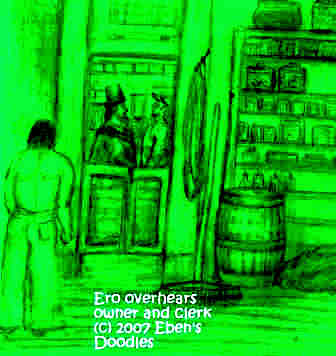
As he paused, he overheard the younger man ask the portly, older gentleman, "Mr. Yesler, we got another sucker up front for you! He's a rube from Kansas, and wants to be outfitted proper for the Yukon! Said he was sure, with his method, he'd be able to locate a bonanza! Sold his farm and has all the cash in hand! Four thousand dollars! Showed it to me too! Want to meet him before I work this little country boy over?"
The older gent laughed. "I don't have time today--got to look after a marble topped bar and some fancy chandeliers from New York I imported round the Horn--heard just a little while ago they're down at the wharf."
Mr. Yesler moved toward the door, then turned back to the clerk. "Give him enough John Barleycorn, so he won't remember a thing what happened here. After you complete the "sale," pull his shirt and boots off and throw the bum out, and if he comes back, tell him we'll have him arrested for trespassing and loitering if he makes any trouble for you! That should shut him and send him running!"
"Sure boss--er, Mr. Yesler, sir, --I'll see he doesn't make any trouble in any case!"

Ero, hearing these shameless thieves hatch their plan, could hardly believe his ears. He was furious, and started toward them, not even thinking what he would do, but wanting to knock both their heads off. As he came through the doorway into the shop, they both vanished! Ero was shocked--and looked around for them, but the shop was empty. Still seething with anger, he rushed down the tall aisles, stocked with all sorts of mining gear, but he saw no sign of the crooked Yesler and his jerk of a clerk. As for the rube from Kansas, there was no one of his description either. Bursting through the door, Ero stood in the narrow street cluttered with the supports for the level above, looking everywhere around, but the street too was empty.
Thoroughly disgusted by a place that had spoiled his shore leave for him, Ero looked for a way up and out of the underground city, and after several false stairways, he found one that took him out. With relief, he stood and breathed in the fresh salty air just to clear his mind of what he had experienced in Mr. Yesler's store, and then turned back toward the ship.
Back at the ship, the captain waited for any sign of the rival Black Ship, so that he could sound the alarm with the old-fashioned ram's horn, or shofar, Wally had thoughtfully provided. He hadn't yet run up the Blue Peter, but that could wait a bit yet, he thought. And if the Black Ship showed its ugly snout, he wouldn't need the Blue Peter anyway to call the crew back.
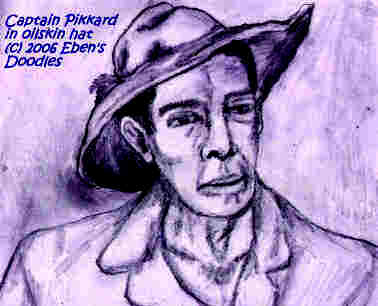
He had no desire to find his fine vessel scuttled, with the pirates cutting off their only means of escape before launching a final attack to wipe them out or enslave them. This gave him time to consider his decision. He would have liked to relate his reasons to his crew--but decided to wait for a later time, so that he could think about them a bit more.
He was still amazed how a random book he found in Mrs. Funnemark's lending library, kindly offered him by the lady, held just the wisdom he needed in a tight spot.
It was a book called Consolation, and was meant to encourage the Christian on his life voyage. It was divided by months, starting in January. Reading January 2, he was struck by the description it gave of the storms every mariner must face and somehow endure and overcome. The title was "Sail On!"
Every word seemed written just for him. "So now into another year we sail, O Time Mariner! And something of what we may expect as we continue our voyage we may infer from the past. Without doubt storms will come as they came in the bygone days. But we will give them firm and courageous welcome, for we have already weathered so many storms that we are unafraid of the wind and the tide, the lightning and the snow..."
"Consolation" did not promise a smooth sailing, evidently. "Sails torn of course as they should be, spars and masts all strained and creaking without doubt, and many a mark of the tempest upon us, but still masters of the waves and winds we shall be. And so we shall--when the Voyage is completed drop anchor where no storms come, but where, the green swell is at last in the haven dumb, and we are forever out of the swing of the Sea..."
A poem, "Hitherto," followed, which the captain thought Ero might take a hand at, providing the music. But where was the ship's fleet-footed musician anyway?
Pikkard went and took a binoculars and scanned the shore, but Ero had long since disappeared. He hoped it would go well with him. He had so far not done the White Ship any favors on his own--and returning late as he did, they all had been put in danger by remaining too long in one spot. That had set them up for the surprise, ferocious attack in the harbor that was meant to sink the ship and drown them all.
Meanwhile, after he looked down toward the ship and saw no Blue Peter flying, Ero continued exploring and doing reconaissance, to see if this city was the one where the Golden Fleece was being held captive by the dragon as its special treasure. Though he saw no sign of wily King Aeetes, Phrixus, and the Fleece of the Heavenly Ram, he still turned up some interesting things. A revolving globe of the world above the entrance of a newspaper building still revolved and told the time, though the clock hand was out of control and spinning madly around, making a high-pitched sound like an alarm going off.
He went in and found a stranger sight. Hanging from the ceiling, rows and rows of people, their eyes moving so that they appeared to be alive, were suspended on strings like puppets. They did not seem to notice him or nobody called to him to cut the strings so they could be free. Instead they were all muttering in unison, but it was mumbo jumbo to his ears until he chose Greek on his hand-control.
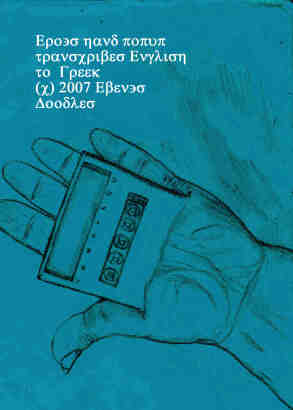
Now he understood them perfectly.
Their words transcribed to precise Greek, which had no such weasel words as English abounded with, he was amazed to discover that they were all lying, with either poker faces or smiles, it made no difference. Liars! Lying puppets pulled by an invisible puppet-master!
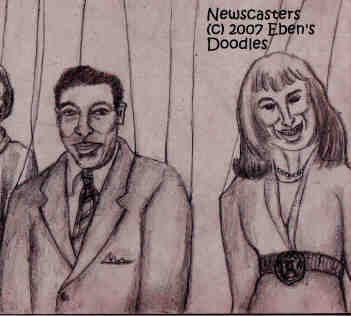
Disgusted as any truth-loving Greek would be, Ero left, not noticing the cartoon briffitt that appeared in his wake. He didn't even hear the joke a comedian laid on him as he passed.
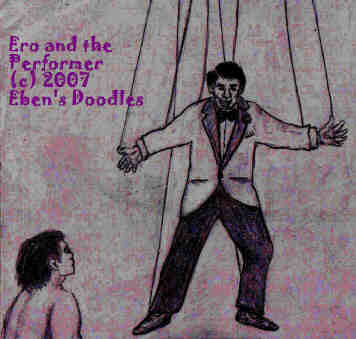
Back outside, he almost ran over a tangled mass of hair. It was a huge hairball, standing upright somehow on two legs and with shoes on that smelled like boiled cabbage and something worse added (Wally regretted the bytes needed for boiled cabbage, but he did it anyway). Then a hand reached out from the hair and brushed away some hair, and a man's face and head appeared.
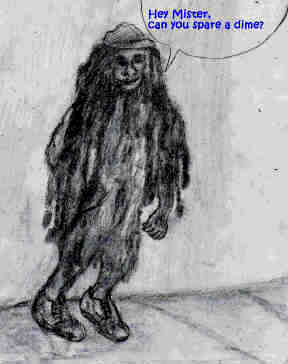
"A dime?" Ero wondered. But he didn't have one! What could he give the poor hairball-man anyway?
As he was wondering what to do, the lookout caught up to him. He landed where he liked to sit--where he could look Ero right in the eye.
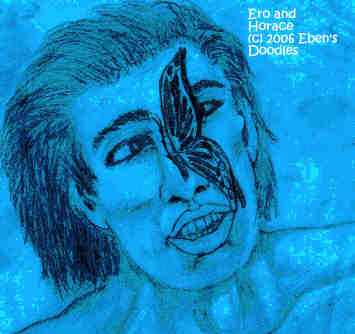
Ero, knowing exactly what Horace was telling him, even without a speech balloon, laughed, "Okay, I won't do that again. I promise!"
He turned back to the beggar. "Do you want to go with us? Maybe the captain will take you onboard the Argo, if you don't want to stay in this city."
The hairball-man gazed round with horror, showing that he much preferred to go with Ero and take his chances on a ship than remain.
The three then continued on the tour together. The state university, the many art museums, the Space Needle and Science Center, Pike Place Market and Pioneer Square--they saw the things the city took most pride in, evidently.
At the Center, beneath the Space Needle, they were turned away when they attempted to use the elevator without paying. They were leaving when a popup brought them to a halt. "Questor choose a bot for transport to the observation deck,' the message read. Horace could fly himself easily enough, but Ero and Hairball looked at the selection: flying carrot-bot, jumping kangeroo-bot, and hopping-rabbit-bot. Ero didn't like the looks of either kangeroos or rabbits taking him anywhere, much less to the top of so high a structure as the Needle, so he was left with the carrot-bot. As for Hairball, he showed by his terrified expression that he wanted nothing to do with going up over fifty stories without an elevator.
Thinking he might catch sight of the Golden Fleece from the Observation Deck which lay 20 feet up from the topmost of the three revolving restaurants, Ero pressed the carrot on the screen with his big toe.
Immediately, the popup was replaced by a giant, leafy topped carrot. But how was it going to get him to the top of the Needle? Ero wondered. Then he saw the rope attached to the top of the carrot. What? He was to hang by a rope as the flying carrot shot up over five hundred feet?
Only a Greek would try such a thing. A moment later, he was launched. A spaceship briffitt appeared in his wake.
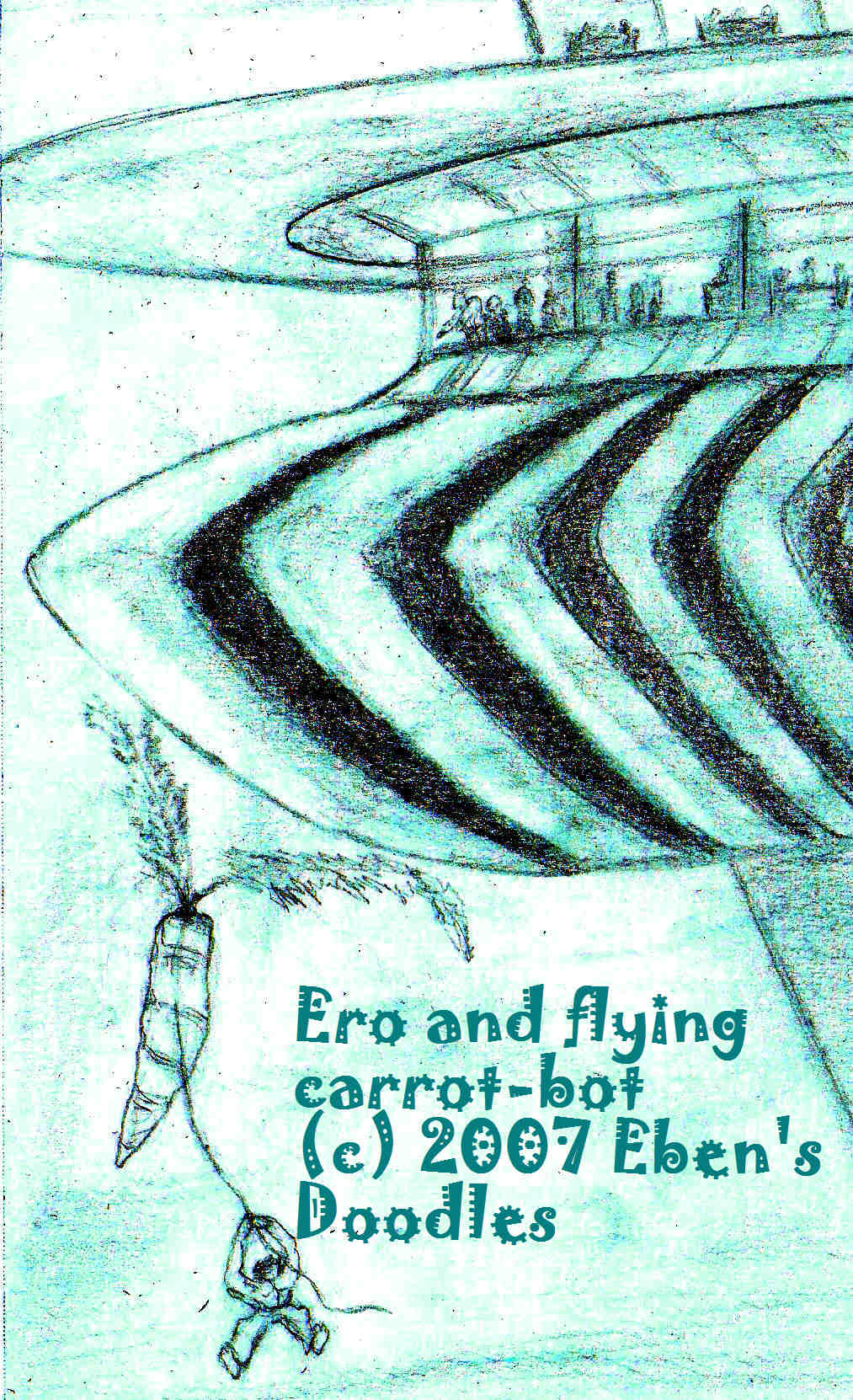
Diners in the Emerald Room restaurant looked out and there he was, with Horace his faithful Man Friday! They hardly batted an eye, as if he were some kind of native bird.
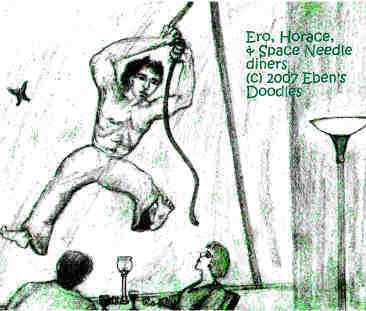
He was set on the top of the Space Needle.
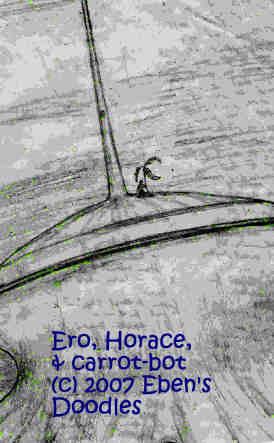
The top of the Needle was not spinning, unattached to the two revolving restaurants below the observation deck, but he did not need to be turned slowly around like a chicken in a broiler. He viewed, without a single thing in the way, a panoramic view of the entire landscape of Kastorr. To the north, the Emerald City's neighborhoods and condo developmets sprawled amid lakes and highways. Looking south toward Olympia in the South Sound, he saw skyscrapers, a squashed onion that was the sports dome, and a very big snow and glacier-crowned mountain. To the east and west, the Cascade Mountain Range, many lakes, and the white, jagged-peaked Olympics. It was utterly foreign to his Greek eye--a land too green and forested, an ambiguous city too dull to his eye though glittering with a lot of glass and metal--everything just too muted at the edges and soft like a chamois, without the sharp antitheses of Greek landscape and architecture, where black was still black, and white was still white.
Kastorr, unlike Greece, was a vast gray zone of water, sky, and mountains, without any clear, sharp distinctions; everything melted or merged with something else, even if there was nothing held in common; it was a muddle, a stew of half-formed things, a mist and cloud that would never become anything solid you could get your hand on. Nothing there would really taste different from something else, nothing would smell with a unique aroma only it had possessed--could the Golden Fleece exist in such a bland and tasteless flour pudding as this country? he wondered. His heart suddenly turned over as he gazed at the rolling world of mostly gray-green below him--how he missed his Greek homeland, its cities shining with eye-dazzling whiteness and the lines of roof, wall, and door steps etched against the inky blackness of the shadows as with a razor-sharp stiletto.
How he missed honest Greek faces, honest Greek smiles! Here the smiles were puppet smiles, that jerked on and jerked off. Such smiles meant nothing--they did not come from beating, warm, red-blooded human hearts--they were all on the surface.
Ero, after a minute, had enough of the Emerald City from its highest point. The carrot-bot was handy enough, and the trip down was even faster. He rejoined Hairball, and together with Horace went to explore the Center.
Ero and Horace were soon in the International Fountain, enjoying the spray and the jetting waters, while Hairball stood well back from the spray, as if he hated the thought of getting the least bit wet on his dread locks and hair balls.

The fountain was the most enjoyable thing he had discovered in the city! Getting out, he shook off the water like a dog and they continued exploring, though Ero's hopes of ever catching a glimpse of the Golden Fleece in this city were well nigh gone.
What was next? It so happened that they turned toward the Lake Union ship canal and the Locks where there was supposed to be salmon running to their yearly spawning sites up some river. On the way they swung by Hairball's old haunt, the U of Dub. He used to hit up the unlimited supply of guilt-driven, compassionate students that flocked to the crack houses and porn shops and strip clubs that he knew in the area--and slept in crates or Dempster Dumpsters behind McDonalds or Starbucks. Once he tried to sleep behind the main off-campus bookstore, but some employee came out to the Dumpster where he was exploring the mystical gardens of Shangri-la and dumped the Collected Works of Timothy O'Leary on him and nearly killed him.
All this he was not relating by human speech, of course--for he was a mute, his speech center destroyed when his genius-IQ brain was fried by bad LSD years ago. Instead, Wally had thoughtfully prepared for this with plentiful speech balloons that enabled Hairball (the son of a well-connected university professor with considerable name recognition who rose to being a highly tenured cipher in the office of the Lord Chancellor of the University) to really let down his hair, so to speak.
All his father had to do after his promotion to administration was smile occasionally, smoke his pipe discreetly, and say nothing at the various meetings. For years he served the University and the Chancellor by doing nothing but draw his considerable pay, but he was highly respected and, found stiff and apparently stone dead in his office chair one day, he was duly eulogized one of the University's most valued academicians and administrators.
Hairball's mother? She was a Smith College graduate, and had scored high on some important test and then done something in mathematics once that got her name in a scholarly magazine. She had evaporated somewhere along the broken, intermittent line of his life--and the only place he could come up with regarding her possible whereabouts was Erewhon, a place he would not be able to reach anyway, walking on his own sore and tottering, fungus-diseased feet.
Following Hairball who served as their guide to the underbelly and groins of the University, Ero and Horace got to know every Dumpster where Hairball had slept once upon a time, and also the places where he had hung out and hit on the compassionate students passing by. It had been a good life while it lasted--but with both his parents' passing, he had no reason to stick around. They couldn't be shamed and made to feel guilty anymore. He sensed he had lost his power base, so he moved downtown. There he found another unlimited supply of guilt-driven, compasssionate people from a number of upscale businesses, software corporations, Boeings, Starbucks, etc. He had milked this lucrative trade for a number of years more. He didn't know how long, or even how old he was getting--things just went on and on.
But then came a day he could not understand. He had found himself lying face down in a puddle of his own urine, or maybe someone else's. It was urine, that was all he knew, and there was a lot of it. He was soaked. But hands pulled him up, threw him on a stretcher, tied him on, and carried him somewhere in an ambulance. He was attacked by shift after shift of nurses and doctors. What did they want? Was he going to die? He could not talk, so he could not get them to tell him anything. So he just kept smiling.
They were pretty mean to him though, despite his smiles. They shaved off all his beautiful, warm hair, took his clothes, stuck him in a baglike robe with the back missing, and dropped him on a cold bed hard as a board.
He was lying there helpless and naked as a baby, wondering how he was going to run away with no clothes anymore, when the whole building began to rattle and shake.
Things crashed. The ceiling was falling down around him. Everything turned dark.
Then he found himself walking the streets again, down by the Elevated. How did he find his clothes again, and how did he get away from the awful place where people stuck tubes into his nose and those other places they found on his lower body? They had taken the blood out of him too, and replaced it with bottle after bottle of something else. They had been so cruel to him--despite all his smiling at them. He tried to forget them and what they did to him after he was back walking the streets again.
Yet though the buildings, docks, and ships and trolley and Pioneer Square and Pikes Place Market all looked the same, it wasn't the same. Most of the people were gone. The cars and trucks were gone too. What people there were all liked to demonstrate, and always they burned the city down, again and again. Each time they burnt it down, it wasn't long before it grew back up again, without anyone's help.
He didn't like all the fire and noise and the people running and the buildings crashing down, so he moved to the Underground City. But that wasn't so nice either. It was a place where no one had compassion or guilt. He could not find anyone to give him a hand-out there. They were all trying to steal from him. And the police were always after him. He had to be very careful there, so he moved back to the Upper City. Here, other than when it was being burnt down by the world peace demonstrators, it was possible for him to survive more or less as he had before. It was not a good life, but it was bearable.
Then one day a new ship came into the harbor and let off its crew. He met one of the crew, a black-haired young man with no shirt and just pants, and who had no shoes. He was a kind person, and didn't hurt him or kick him or throw him into the gutter. So he liked him and hung out with him, hoping that it would continue, at least until the demonstrators started again and he would have to leave him and go where he knew the fire wouldn't come.
All this was related to Ero, who could hardly believe it it was about a human being, until he found it getting to his part of the story of Hairball's life--though to Ero's thinking, it was no life at all even with his contribution. Before they left the University District, Hairball turned in at one of the campus buildings where he must have encountered his father once when he was still teaching Comparative and Applied Sanskrit Philology II or III. Here Ero was treated to a lecture, or part of one, by a renowned feminist who had flown in, taking a break from a class symposium on Tibetan monks' breathing techniques she was giving advisory support to in Vermont, to be their featured guest speaker--all expenses paid of course by Danz Lecture Series.
As the short, sweatered woman talked about Patriarchalism in American Society, the class was so rapt and hanging on every word that they did not notice they had visitors, Hairball, Horace, and Ero.
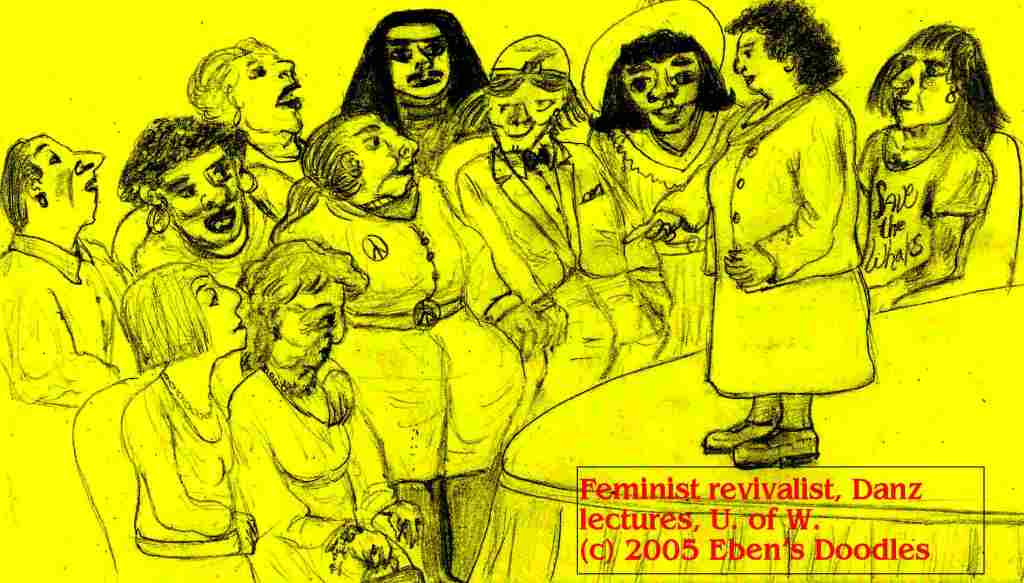
Not able to make any sense out of the woman's impassioned but highly digressive speech (she kept referring to the Amazon Rain Forest, various vanishing species she knew about in Tasmania and Mongolia, having studied them on Sierra Club expeditions, and the once significant Ozone Layer Issue being swept under the carpet by somebody whose name she spoke with a hiss and a joke about the person's happy heterosexual marriage), except that she was deadset against Patriarchalism, Ero was relieved when he saw Hairball too had no interest and had turned to go. Maybe the way Hairball sort of skipped down the steps outside the building tipped him off, but Ero got the impression Hairball seemed pretty relieved his father was not in the building after all.
Lake Union was just a lake, with many houseboats cluttering it up and an ugly bridge at one end, so they circled back.
The expressways, strangely, were filled, not with cars, trucks, and buses but alligators! One of the elevated roadways had collapsed, and one after the other alligators fell to its death as Ero watched--a not unwelcome sight, as he had no desire to meet any of the monsters.
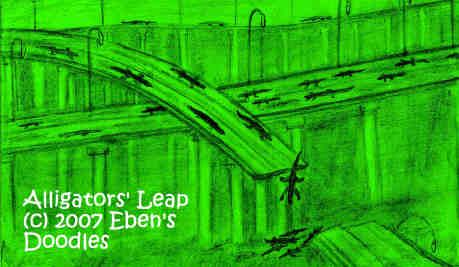
Passing down a street that led to some tall hotels, they saw a big crowd ahead celebrating Bumpershoot, Seafair, and Mardi Gras in a combined celebration. Men and women, buck naked, young or gray-haired, were riding bicycles through the cheering crowd in their yearly Lady Godiva and her Significant Other commemoration. Others took advantage of the crowd to do some pre-paid demonstrating, holding placards that no one noticed were all blank.
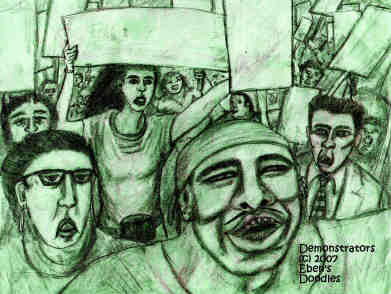
Already, there were incidents of some gang-bangers involved in scuffles ignited by exchanges of racial slurs and the "n" word, and a man just passing by the gang-bangers had been beaten to death with baseball bats and was lying with onlookers gathered around his body taking pictures and making jokes at the man's expense. Others began singing snatches of "We Shall Overcome," "Blowing in the Wind," and "The Age of Aquarius," as they protested the World Trade Commission and carbon emissions and whale harvesting by Japan and Norway, with a few "F" words accorded China for the crushing of Tibet. They smashed windows and spray painted grafitti and peace signs on cars and buildings as part of their show of solidarity against the WTC and the Global Warming trend produced by WTC factories and cars, all for the sake of the environment whose welfare was closest to their hearts.

The yelling and screaming increased as the chain and baseball-bat equipped crowd fought the police who rushed at them in turn with tasers, pepper spray, and firetruck water cannons. It was over in a few minutes, as the crowd dispersed to the coffee houses and gay bars and the most rowdy of them were handcuffed and hustled into vans and driven away toward a lock-up they never would reach. But Ero saw they must have missed one of the rioters, a pyromaniac named Pang who was using his cigarette lighter and was running with it and throwing a burning rolled-up newspaper into each shop, store, and office building as he worked his way up the street.
Followed by the lookout and Hairball, Ero rushed into an espresso coffee bar, beat out the flames with a biscotti-patterned rug from the floor, but when he got to the second store, the window curtains and mannequins in Sierra Club approved UV-blocking hats and sports clothes were burning, and it was too late for that place, so he ran back out. But the other shops and stores were just as bad. He could not do anything more--the city was going to burn down on him, if he stayed. "We have to get to the harbor. We'll be all right on the water, out on the ship!" he cried to Horace and the Hairball. Together, they moved toward the port, but it was slow going--Hairball was like cold molasses and did not move quickly, even though a fire was raging, its flames shooting fire and smoke now from tall buildings up into the sky.
They had gone only a few blocks, when Hairball stopped and turned back around. Ero was horrified. "Where are you going"? he shouted.
Hairball started moving back away. He smiled crazily, shaking his head.
"You can't go back that way! You'll burn to death!" Ero protested.
For a moment, Ero was tempted to run and pull Hairball back with him to safety, and he did run after the beggar, but Hairball had vanished round a corner--and when Ero reached it, there was no sign of him. Had he gone into a building? Ero wondered. There was no time to look. A wall of flames was coming toward him down the street, overtaking and incinerating some fleeing demonstrators and their blank signs--and he and the lookout would be burnt alive if they lingered another minute.
Scooping up Horace in the hollow of his hand and cupping it against his chest, Ero ran for his life toward the White Ship.
"Tell them to wait, and I'm coming!" he shouted after Horace, though he knew Horace couldn't hear him by now.
Something he thought he didn't need right now was another popup, and it appeared right in front of him, a red flashing banner highlighting the annoying message.
"Warning! Danger! Questor must choose one of three options," it flashed at him. "Option #1: Stay on land and take your chances with the fire. Option #2: Swim out to the ship and maybe feed the fishes. Option #3, Answer three out of four questions correctly about what you learned in the Emerald City. Questor will click on the chosen option and press spacebar to activate."
Ero groaned, and aimed a kick at the popup sceeen, but it seemed prepared for this and vanished, appearing a moment later a few feet beyond with a guard rail in front of it.
Ero tried to ignore the popup, looking round for some sort of sailboat, since he couldn't swim in such cold water as this Sound had--but all he saw were big merchant ships, ferryboats, yachts, cruiseships, container ships, hydrofoils, and even the Victoria Clipper--a fleet which could easily transport thousands of people but wasn't going anywhere soon.
Its warning light now buzzing for attention, the popup could not be ignored. Ero thought fast. What real chances did he have for reaching the Argo? Would it help any if he tried to answer the popup's stupid questions?
As if his thoughts had been anticipated, the screen showed a flag, which according to the international flag code was "Yes!"
Ero was now interested, and the popup's defense rail vanished at the same time. He hit Option #3 and the spacebar with his big toe, and the first question appeared:
"Question 1: What local Indian chief did not want his name appropriated by this city, but they took it anyway?"
Ero was stumped. This wasn't his country, after all. He could not even guess it. He knew nothing about American Indians.
A horrible, Bob Barker quiz-show buzzer blasted as loud as a ship's fog horn in his ears, and then the answer appeared:
"Chief Seattle. And, fortunately, he died without seeing it become what you have seen. Next question: What five rulers, or Pentocracy, hold the power in the Emerald City? Hint: The Letter 'P'".
Ero was a Greek, of a race that loved loved riddles and conumdrums, and being an intellect from birth, he had no trouble rattling them off: "Prestige, Parentage, Pelf (or money), Position, and Perspective."
"Correct," responded the popup, giving a musical flourish of Tirolean cow bells. "Next question on the fifth ruler, Perspective. How does that relate to the Underground City and what you saw there and also in the city above? Answer by voice with no more than one paragraph, as this is an Essay Question."
Ero smiled. This was getting him really interested and challenged. For the first time he was enjoying the popup feature of the voyage.
He had two cities to compare, one past and underground, the other above ground and modern, but really they were the same city and disaster in the making, doing the same things--only the city above ground just appeared more sophisticated.
"Perspective and the Underground City relate because the glittering, postmodern city above ground is a product of guilt produced by the low, dirty, crooked city below ground level."
The bells sounded. "Question Number 3: Name three local institutions or artifacts or sociopathic behaviors you saw above ground that are specifically driven by repressed guilt."
Ero relaxed. That was easy! He rattled them off. "Art Museums financed by local robber barons, homeless shelters for the rejects of society, violent demonstrations for world peace."
Bells again. "Last question, and you must answer this correctly to receive the prize, the means to return to your ship. Are you sure you want to return to your ship now? You can remain on this dock, and it will not burn up with the others. Press Spacebar if you wish to continue with the questions."
Ero had to pause to think. What did the popup know that he didn't? Why wouldn't he want to return to his ship now? He looked around at the dock. He had no desire to stay there--it had nothing to offer but some seagulls perched on pilings that looked as if they were plaster copies, they hadn't moved a feather since he had come.
He pressed the Spacebar.
"When you saw a man looking at you through the overhead sidewalk window--there were four sets of eyes present. Identify them, please."
Actually, Ero could think of more than four. "Mine, the beggar's, God's, the Game Players', and the Game Writer's." The Quest, he knew, was a zero-sum game, and so every game had to have a designer and people who played it.
There was a terribly long pause, heightening the suspense, as Ero held his breath.
Then blowing the seagulls off their perches (they weren't plaster, after all), a full orchestra erupted with "For He's a Jolly Good Fellow!"
Ero was pleased as punch with himself. He had proved that a Greek could still think fast on his feet, and also show the world that he wasn't like most 22nd Century people, who moved unreflectively through life, understanding nothing and believing everything they were told to believe--as if they weren't men, but a species of brute animals or automatons and puppets, manipulated with strings by the Puppet Master, or those five, behind-the-scenes rulers of every nation on earth, the shadowy Pentocracy. That quality of quick, independent, critical thinking had made his people, the Hellenes, very great--greater even than the world-conquering Romans--once upon a time--and it was proving an asset even at this late date. But where was his grand prize?
He did not have long to wait. He saw a Leg-o type ladder fly down from a penthouse preschool for software billionaire's children, dropping through the flying ash and curtains of smoke of the burning city and attaching itself to the dock. Towers of the highest buildings were shooting flames--the sound of the people trapped in them was terrible, and many were jumping out the windows, only when they hit the ground they bounced all the way back to where they started, then jumped again.
He didn't have long to get away, he saw--as the dock had caught fire already. He climbed quickly down the ladder to the prize: a dinghy! Just what he needed, though he would have preferred an outboard motor to oars.
Gasping, his excitement was almost too much to bear, he decided to take it rather than leave it.
But he didn't have time to argue with the popup or the prize committee. He grabbed the oars and began making for Alki Point. He had just cleared the dock when a cruise ship further down exploded, catching some Shell Oil storage containers, which also exploded, showering the waterfront with deckchairs, striped Italian Cote d'Azur deck umbrellas, and caffein-free peppermint tea bags.
He made the little boat almost fly and skip over the water to get away from the madness and the inferno on shore. By this time, the city was doomed for sure.
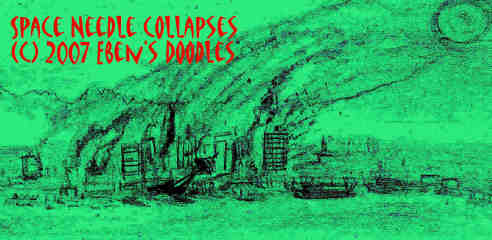
He glanced back just at the moment the Space Needle collapsed.
Once far enough out on Elliott Bay, he slowed down a bit, then saw something a little odd. A stick popped up out of the water just ahead of him, which he saw was no stick but metallic, a periscope. He peered down into the water, but he could not see far enough (how he missed the clarity of the aquamarine Aegean!), though he thought he glimpsed, incredibly, a watery mast and a flag of skull and crossbones. Was the Black Ship turned into a submarine? It was observing the Argo V, but would it turn and see him too? Alone in a little boat, he had less chance of surviving an attack by the Black Ship, he thought. If only he could warn his comrades, before the pirates attacked them! But how?

As Ero was frantically trying to think what to do, his question was made irrelevant as the Black Ship suddenly rose to the surface and shot a cannonball toward the White Ship. The cannonball sailed over the gunwales and...
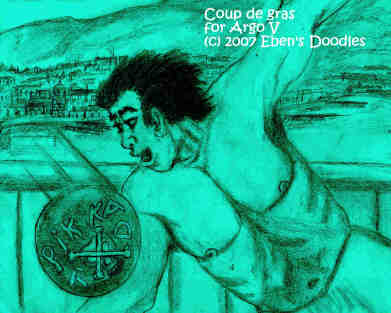
There was a huge explosion. A moment later the air was filled with pieces of the ship and the bodies of the crew.
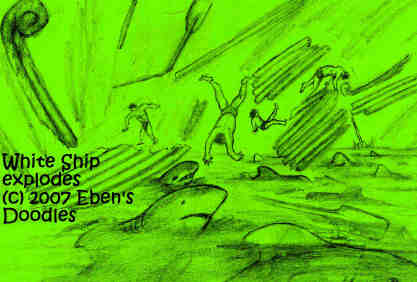
This was not the worst that could happen. As the White Ship crew fell into the water, they turned to fish, but the Black Ship crew was already in the water, waiting for them in the shape of very real sharks.

It was a good thing for the Cybernauts that Ero had his little boat in the area. Fleeing the sharks, the fish leaped into his boat, one after the other and were saved. Some were not quick enough, however, and that was the end of their quest as they ended up in the bellies of the sharks. As the fish shapeshifted back into men, Captain Pikkard turned out to be one of the survivors, but, sadly, Tumpo and her kitchen helper hadn't, along with about ten others of the crew. It would be sad news, indeed, for the newlywed women on the island across the bay, still waiting for their men, to hear that four of them were widows already.
Hovering, Horace appeared, looking fit as ever, for despite his fragile appearance, he was stronger than steel and the blast had knocked him about a bit, but that was all. Rowing as fast as they could, they slipped between freighters and in the tight quarters eluded the pursuing Black Ship for the time being.
Even with the loss of one fifth of his crew, Captain Pikkard had not quite lost the battle, and suddenly a replacement for the Argo V materialized--and not too soon, for the little boat was just too cramped for them all, and they were in danger of sinking.. Gratefully, they scrambled aboard the new Argo V. It was now growing dark, and the Black Ship withdrew to some hidden anchorage. They could not see it, but that did not mean it had gone very far. They could stay where they were, or sail at night by moonlight. With the Black Ship hot on their heels, it was, as far as Captain Pikkard was concerned, six of one and half a dozen of the other.
With an Indian Head nickel he always carried in his pocket, he chose tails they would sail, and Pieter chose heads they would stay in port. Pieter's nickel came up heads, and that seemed to settle the matter. Pieter was relieved, though Captain Pikkard had wanted to sail and take their chances on the open water with the Black Ship, whether it chased them or not.
Pieter went to the stern to draw up his rudders for the night. Just then he saw Horace the Lookout, who did not seem to appreciate the significance of the coin flipping and instead of retiring for the night flew over the bow.
What was Horace doing? Pieter wondered. Didn't the lookout know they weren't going anywhere at night and were sensible as Dutch to stay where they were?
The captain, noticing Horace's leading, did not object as Pieter thought he should.
Pieter turned to the captain.
"Aren't you going to call him back, Meinheer? He's a fool to think he will lead us at night like that! Let's not follow him when, sure as schlemf, we don't know what lies ahead! We'll end up on a rock or a reef for sure, even if the Black Ship doesn't get us out there in the open! We should stay here, where we're in waters we know!"
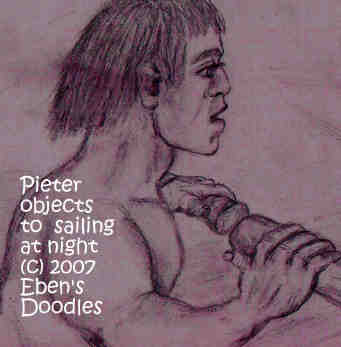
The Captain smiled, and gave orders. In a few minutes, the sail was unfurled, and they were off, following the lookout into the darkness as the disgruntled Pieter stood at the bow watching Horace, fuming, after the Captain took his place, relieving him of his duty at the helm.
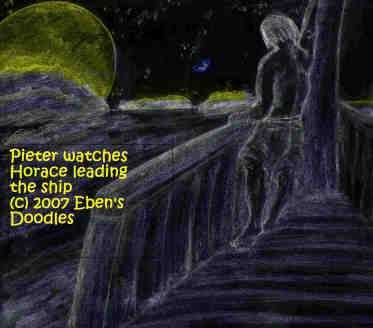
As the captain stood at the helm, he had reason to think about Pieter and be concerned. His behavior was raising a lot of red flags and questions. Why did he seemingly care so little for his own deliverance and narrow escape from termination? Why did he not grieve for the loss of their ten comrades and the two women? Why did he not thank Ero for the part he played in their rescue? If Ero had not been on in that little boat, right where they needed to be picked up, they would all have been eaten! Ero had no idea how he was being used by God--he was surprised when the men all hugged him and wept, so overcome they forgot their dignity as they thanked him over and over.
Ero was humble, indeed, and kept saying he had nothing of the kind in mind--it had just happened, that's all! Captain Pikkard glanced at both Ero and Pieter. They were much the same age, but how different they were in personality and character. A long voyage like this one was already proving very revealing of the men's characters. A man's heart was not going to remain hidden and secret--all a man's flaws and his strengths too would come to light--the longer they sailed together! Pieter had a number of excellent Dutch character traits, to be sure--but that thick-headness and his unbending will and narrow, unquestioned perspective, they were already working against him and his value to the possible detriment of the crew and the mission itself. Not willing to venture out when they needed to leave Elliott Bay and put the Black Ship behind them, he was not looking ahead--he was trying to stay in a place he thought was a relatively safe haven but which was really a trap with only one exit: termination.
Then, with Argo V out of the way, the Black Ship could seize the Golden Fleece--which would be a total disaster for Kastorr! The game would go on and on, with other subsequent crews in White Ships perhaps to take their place, yet nothing but evil would be ever achieved! Like a wheel of fatal doom, it would spin round and round, endlessly repeating the same hopelessness and evils. This was Captain Pikkar's thinking, at any rate, and he could see, in his mind's eye, what it looked like already--a sort of negative rupture in the positive fabric of space, gulping and drawing everything into its yawning mouth--extinguishing every last electron of light forever in the whirling unending blackness that was evil itself.
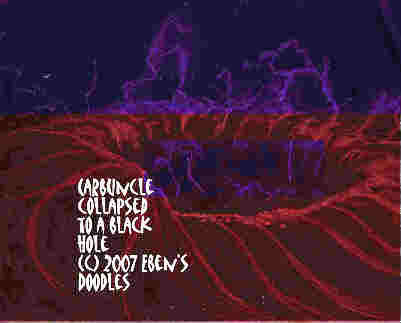
Captain Pikkard, after a while, called Ero to the helm to take over the rudders, and Ero came. With his sharp Greek eyes, he could follow Horace better, he knew. Pikkard leaned against the side, sweating and almost sick with tension, as he watched Horace leading them in a southerly direction, but in a twisting, round about way, skirting every island and headland along the way, keeping out of the moonlight as they hugged the opposite coasts of the islands. Would this throw the Black Ship ship off? he wondered. It was the larger vessel, unwieldly in the water compared with the White Ship. Thank God for that advantage, Pikkard thought!
Meanwhile, Pieter sat, hugging his knees, with disgust on his face, as if he were thinking this was a wild goose chase that could only end in shipwreck and disaster.
Captain Pikkard went over to him. "We had to leave Elliott Bay," he explained. "Staying there was as good as suicide. You saw what happened to the Emerald City. Somebody intended to barbecue us there, along with our ship! We got out just in time!"
Pieter remained silent, his head down, but his Dutch jaws grinding away audibly.
"Well?" the captain prompted. "Don't you understand, Pieter? We had to escape, even if it means taking the risk of sailing these waters in the dark!"
Pieter, not longer quite so taciturn as he had been in life, burst out: "But why not stay here? It's night--nobody can see clear enough at night to sail this ship safely! Captain, let's go back now! This is crazy!"
Captain Pikkard shook his head slowly. "We're sailing on! We're going to try for Olympia, a city at the far end of this Sound. The Golden Fleece is somewhere out there, waiting for us, maybe that very city. You must trust our lookout, Pieter. I am trusting him! We have no choice anyway. Either he gets us through this tight spot tonight, or the opposing ship catches us and gives us the coup de gras!"
This statement really steamed the Dutch helmsman. He couldn't help himself and said exactly how he felt.
"Captain, why can't you shoot back, or catch those dirty rotten pirates by surprise at least once with a cannon shot? I'm an expert shot! Cannonry is in my good Dutch blood! We have the cannon on board--why do you keep it all packed up? We might as well not have it if we're not going to use it! Let's give those filthy, little rats what they just gave us--and twice as much back!"
Captain Pikkard did not answer at once, as he considered Pieter's words. Finally, he replied, "The cannon will not save us. Our best efforts will not save us--you saw that in Elliott Bay. It is Grace that will save us, and mercy. And if we use the cannon and blow them up, what good would that do? They would be all the more furious and determined to get us afterwards when they get their new ship. No, I want them to think there is something more important to us than our own survival: finding the Golden Fleece! I want them to think we don't fear them so much, that we only fear not winning the Golden Fleece! When they come to that view of us, they will start making mistakes as they grow divided in their thinking. Some will want to win the Golden Fleece for themselves, others won't. The crew will not be of one mind, and the captain will be less effective as he gives orders for maneuvers. A divided ship cannot navigate very well, and may even end up with a mutiny. Let them eliminate themselves--that is my stategy--and some may even cross over, decide their mission was wrong and evil--which it is!-- and repent and change their ways! It can happen, if we give them the chance, and don't foolishly unite them by attacking them."
Pieter's eyes blazed. "You mean, captain, we are to act like cowards and can't fight them, man to man? You mean we have to run, our tails behind our legs, from our opponents who are trying to terminate us every chance they get? If that is the tack we take, we will just make them all the more determined to do us in, if we act so contemptible and throw away any respect they have for us!"
Captain Pikkard took Pieter by the shoulder. His eyes were sober and calm, but glinted with steel. Pieter had never seen the captain this way before. "Pieter, you don't understand the core issue and the way men move, and the reasons they act as they do. There is more to men than you imagine or think. Don't you realize that they are slaves, and feel the sting of their servitude every time their captain issues an order to them? If they don't jump to it, he can have them thrown overboard! Their lives are of no value whatsoever to him--the moment they cross his will! He despises them, and they hate and fear him in return. He is a tyrant, using them for his own ends, which is to kill, steal, and destroy--a pirate's whole reason for being. He is that kind of skipper. They fear him, but they will never love him. He rules by brute force and cunning alone.
Now if we give these wretches and captives of his just one chance to think there is an alternative, I truly believe some will take it--for there lives deep down in each man's breast a tiny, guttering wick, a candle-light of desire to be free, to do right, to love and respect others, and to be loved and respected in return..."
Pieter's ears burned, and he wrenched his eyes away from the captain's riveting stare. Never had he heard such nonsense, drivel and gush as this!
The Captain, seeing his admonition was wasted, let Pieter go, and went back to be with Ero at the helm.
The night was long and seemed to pass with excruciating slowness. The tension made the captain stand leaning against the side, wondering every minute if they would clear the rocks they were grazing by mere feet and inches as they hugged the cliffs and shorelines of the islands and peninsulas.
Only when they passed beneath the Narrows Bridge, moving swiftly down the channel toward the islands of the south end of the Sound did he breathe easier.
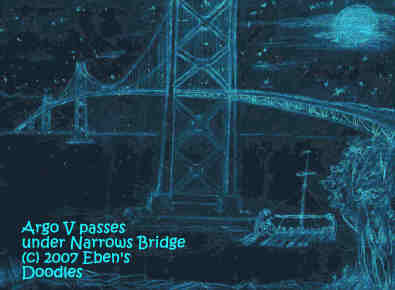
They keep to the dark sides of the islands as much as possible, and make their way down the western side of Vashion Island, and without stopping at Point Defiance and the City of Destiny proceed to McNeil and Fox Islands, slipping between them when the coast seems clear of any Black Ship. Light was dawning. It would soon be morning. They see some unusual sights now along the way, but cannot stop to admire them. One headland looks like a man's face--and Ero gives it a name--Drowned Chief Rock.
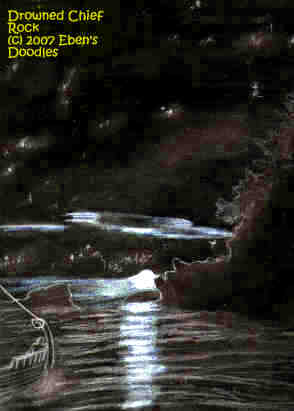
The southerly winds continued brisk (with a rather chilly, northern edge to them), so they could use the sail and rest from oaring. Continuing west, then swinging south, they come in sight of a great dome sticking up over the tree tops of a high, 100 foot outcropping of rocks and trees.
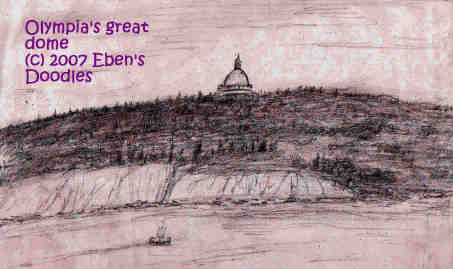
It is a startling sight to the Cybernauts. Olympia! Ero is especially excited to hear the Captain give this city a famous Greek name. It recalled his Olympic Torch Bearer past, but also his lost chance at Olympic glory. Now he remembered that he had never made it to Olympic gold and immortality. Never! It was a terrible thought--the finality! Yet here he was in an Olympia, though it was heavily wooded and set on a peninsula instead of being in the middle of the large, classical-ruin-strewn, United Nations island preserve of the Peloponnesos.
Ero could hardly keep from jumping overboard and swimming to land. They kept sailing and came to the city itself--once a busy port, but where were the Olympians? The captain granted them all shore leave, for this might be just a screen for Aea, the capital of Colchis, and the Golden Fleece might be hidden somewhere near them, guarded by a never-sleeping dragon.
Off they all went as soon as they had breakfast, all carrying swords, as the Captain thought, after their last encounter with the pirates, they might need them. They forgot about the grief of losing ten of their number--friends and co-Cybernauts--at least for the moment. Captain Pikkard, as his habit was, stayed close by the ship while the men enjoyed their freedom. He had time to think now--of the Quest and how it was going. So far, it was not showing much promise, he had to admit. They had suffered some fierce, totally unprovoked attacks by the Black Ship, and more were no doubt coming. Another cannonball, and they would be finished, out of the game forever. Could it be avoided? The opposing captain seemed to have a perfect aim--probably gained from a lot of practice. But why didn't Captain Wolvewoeld join forces with him and together with the White Ship look for the Golden Fleece? There was enough Fleece for them all. Why did he have to try to stop them from finding it and sharing it with everyone?
As Captain Pikkard thought about Captain Wolvewoeld and their prospects and made entries in the ship's log, Ero headed straight to the item of chief interest to him--that shining white dome he had seen.
He climbed up the hill from the port and made his way down through neighborhoods and found a large complex of marble buildings. They were all in Greek style--which was fitting for a city named Olympia. He went into the grand, domed building first--and despite the gleaming white columned exterior he found nothing but gloom inside, the entire interior draped with huge coils of what looked like dusty cobwebs.
Could they be cobwebs? he wondered, aghast at the size of the strands. Craning his neck, he peered up into the dome, but could see nothing. Something huge was blocking most of the light.
Ero thought of something. He climbed the marble staircases, then found the access to the metal staircase that circled and led up into the dome. Here the strands of cobweb hung down all around him, and he took one, and tried to break it, but it was as tough as steel, utterly unbreakable, though it was easy to bend.
He was looking up into the murky dome when he saw something move. Legs, like those of a spider, thrust out of the enormous, sack-like object hanging suspended in the dome.
Ero almost fell back down the stairs. He knew now what it was--an immense spider!
He soon recovered from his shock and horror. He had no fear of spiders, unlike some people he knew. He hated them, however, and this one was a challenge to him. How could he kill it? he wondered. He had to get to it first.
But he soon thought of a way. He climbed up higher, then grabbed one of the long ropelike strands, and swung out toward the monster, unsheathed sword in hand.
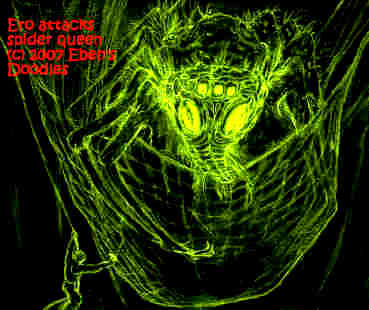
Ero, of course, had no idea he was attacking a certain former governor. She had usurped the position in a corrupt election, and survived the scandal to take the governorship. Somehow Wally had gotten hold of her DNA at Tutasix, and so here she was, recreated not as a human being, but a strange and particularly ghastly hybrid--a spider-elephant. With an elephantine proboscis, the spider part was formidable, as it could grasp what it wanted before pulling it in to administer a killing bite of lethal poison. This was not Wally's doing necessarily. When her character and behavior was considered, it pretty much dictated how Christine--her first name--would come out in virtual reality. She had passed laws authorizing liquor sales on Sunday so she could rake in more state taxes. These laws had caused a lot of DWI's and hundreds of accidents, with many fatalities. But she got her additional tax money to spend.
The first thrust of Ero's sword did not produce any response, though it drew blood. Repeated thrusts did--the spider leaped to life, its multiple legs flailing as it fought to get out of its web nest and go after whatever was attacking her. Ero, seeing it was going to pursue him, slid down the cobweb rope and reached the floor with a leap. There was a tremendous commotion overhead, along with gallons of blood splattering down everywhere. Running to get out from under the dome, Ero made it outdoors. His sword and pants were gory with spider blood. Disgusted, he ran over to the nearest fountain in the capitol garden and plunged in.
He had not climbed out yet when he saw the monster was out in the open, her eyes temporarily blinded by the light.
He could see her bleeding, but there was still a lot of life left in her as she began moving this way and that across the Capitol lawn, as if sniffing out his trail.
How Ero wished he had use of the ship cannon. That would finish her off! But his mere sword--without surprise, it wouldn't be any good at all. He decided it was best to run for it, and maybe she would bleed to death chasing him.
As he started running, her eyes caught the movement and she leaped after him. It was a mad chase. He sprinted past the Temple of Truth, and she was hot on his heels.
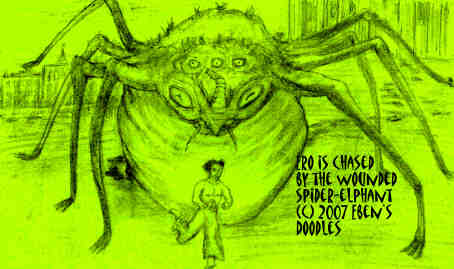
It was the sight of the millenium, no doubt. He turned, doubled back, and ran up the steps and entered the Temple of Truth. The doors were only so wide, and she couldn't reach him, which he had counted on. But she was banging against them with the whole weight of her body, and that made her bleed all the more. She was losing a lot of blood, as it flooded into the Temple of Truth, making Ero move back away.
He went to the back exit of the building, hoping to get away. But she was cunning, and had seen him through the door. She was waiting for him on the other side. He barely eluded her as he leaped over the steps to the ground and kept running.
As he ran down the road toward the ship, he could see she was falling further behind. She was losing strength, he saw. He turned, and watched her collapse, and then, just like a spider, her legs began to curl up around her body. She was dying! He cheered and jumped up and down! He had killed her! He went back to take a closer look.
More hideous than he had thought possible, he walked around the carcass carefully, just in case she was faking it and suddenly made a leap at him.
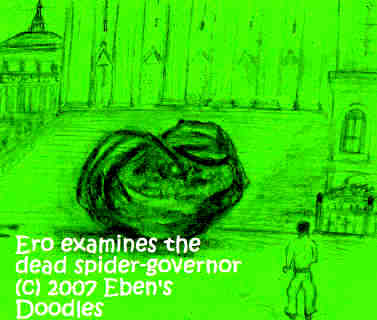
But she kept still--her reeking blood was everywhere, stretching all the way from the Capitol Dome, which had been her lair and domain for who knows how long.
Ero was pleased with his day's work. One monster down, how many to go? He felt wonderful. It had been a messy kill, but worth it! It was good riddance, and he knew the world was a better place with her out of it.
Now what? He wasn't going to let a spider-elephant spoil his shore leave. There was still a lot he hadn't seen. He continued walking. He came to large, resort-type buildings. Stepping inside, he found the place packed. Here were all the people! Thousands! And they were all gambling, or eating, or watching entertainment, or fighting each other, screaming with horror when their money ran out, and trying to rob the cashiers! It was chaos! Yet nobody ran out. Murders, robberies, fights, screams, bloodshed--it didn't keep the business from going on as usual.
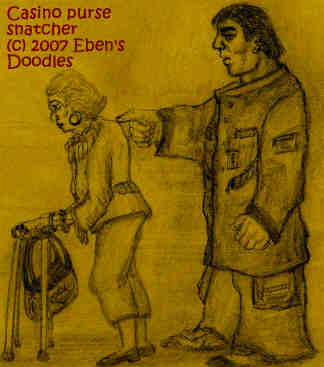
The attackers were hauled off by police, but others filled their place instantly as if they had not even been there. The same crimes went on, but after the police used their stun guns and tasers, handcuffed the trouble-makers, and dragged them off, other people came in, and on it all went. He watched several people win jackpots, but they no sooner got their winnings when they were robbed and either shot or stabbed right there in front of everybody.
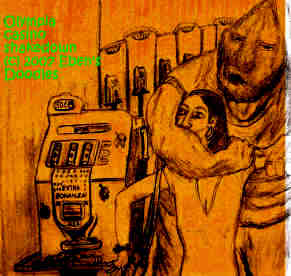
It didn't matter to anybody but him. Whenever he tried to stop the crime, the casino's security guards rushed in and protected the criminals! He wasn't covered by casino insurance, they told him angrily. He could not do anything to help the victims even when they refused to help. The hearses came, and the police arrested a token amount of the worst criminals and made their reports and left. They were soon back, of course, as the same crimes were committed again and again.
Ero couldn't stand seeing everything repeated again and again, so he fled outdoors, leaned against the building and felt almost sick.
Where the people all crazy? he wondered. How could they stay in such a place, when they were certain to become the next victims, unless they were the victimizers!
Ero had to get away from the casino. It was a madhouse for lunatics.
By now Ero was wondering if he wanted to see any more of Olympia--a city that hardly deserved the name of his once beautiful Greek city populated by Olympic champions! There were signs up on every major road proclaiming it to be an "All-American City," but it was nothing but a City of Thieves, worse even than the crook-filled Underground of the Emerald City, with a spider-elephant for its queen! He had killed its poisonous, bloated queen, but that didn't seem to matter--their grasping octopus of a casino went on, day and night, the same way--and nothing could stop it from squeezing and sucking out all the life from its prey just like any spider would do from a trapped fly.
Ero looked around, wondering where the Golden Fleece could be in such a horrible city as this one. If there was a guardian dragon, where would it be? Who could tell him? Maybe he could find someone in one of the houses or the public buildings or the stores and businesses? They couldn't all be empty, the people all gone to the casino, he thought.
Would he find a beautiful, beguiling Princess Medea and her father, the wily old King Aeetes? How much of the grand story of his people about Jason and the Argonauts would he discover taking place here?
"Say, whom are you looking for?" said a voice behind Ero.
Ero spun around to find the strangest-looking man he had ever seen in his life. A long, horn-like spike of hair shooting up from his head, dressed in a long-sleeved upper garment, of gold and purple velvet cloth with jagged, jester's fringes, and a red cape loosely draping his shoulders, and green tights on his legs, his two-pronged goatee making him look like an imp or even a devil--the willowy-thin gentleman with short hair and sideburns laughed between ghastly green-rouged cheeks that matched those of the balloon he held on his right shoulder. "Hello! Stuart M. Hawkins, Esquire--the unofficial, underrated, totally undaunted Poet Laureate of this, ah, fair city, at your service, sire!"
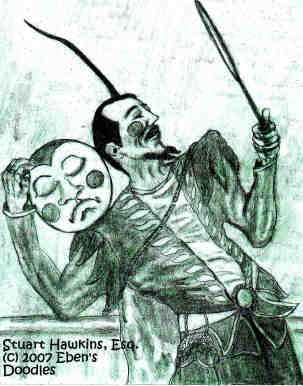
Ero, though he had seen some odd people and sights already on this voyage and quest, could only stare. The man or devil or leprechaun or wizard seemed not offended in the least at his audience's reception, and laughed again, then began reciting something that, with all his flourishes of the hands and body and the glassless mirror he held up in his hand, seemed Shakespearean, or close to it, except the words were plainer and more Greek like than Elizabethan English:
"Foxy Benedict had a nightmare
In his dream he went to hell
To indescribable horror
Foxy was surprised at the dream
Because he believed in neither heaven nor hell..."
In an elaborate, vaudevillian aside to the grumpy balloon face, the actor (for he seemed to be an actor after all, performing to one amazed Greek torchbearer and cybernaut), he said in a loud, stage whisper:
"Well, Foxy, you old rascal, I guess you and me have a lot in common today! I too died--so it seemed--and here...alas, here I am!"
To drive home the point, he made signficant glances to left and right, toward the Capitol and the surrounding city.
Amazing Ero, the balloon face's eyes opened, he stuck out a long green tongue, withdrew it, then went back to the way it looked before.
"And who, do I have the pleasure of meeting?" the poet asked. He stuck his mirror in his belt and extended his hand. "Excuse my old costume from my vaudeville days! I am really a rather common man in his tastes and habits, a suburbanite family man with one good, loving wife, two grown daughters, a few cats, some goldfish in a pond, a vegetable garden...and you?"
Ero shook his hand. "It is too long a story, I'm afraid. My name is Ero, and I am from Seriphos. Do you know of it? It's small, but was once very famous, because of Perseus being born there."
The poet stroked his double goatee, then laughed. "As most people here, I don't have any great grasp on geography. It could be an island somewhere, from the sound of it. Could it be in the Sound?"
Ero shook his head. "No, I come from Greece. I never wanted to be in a place like this, but here I am! I am an oarsman on a ship in the harbor--the Argo! Do you know my ship? It's pretty famous a name."
The poet's eyes brightened. "Oh, yes! I know of it. What? Are you serious, or are you mad? Do you mean the real Argo, or some copy of it?"
Even the balloon face's eyes popped open with amazement as they stared at Ero.
Ero, trying to ignore the balloon face, replied, "It is real enough! We even have a Jason on board, though he isn't the captain on this particular voyage, just another oarsman like me. I am the musician too--though not exactly Orpheus in the ancient account. An amateur--you might say."
The poet looked on him in disbelief, which he exaggerated histronically with arched eyebrows, aped by his sidekick the balloon face. "Are you pulling my leg? Where's your harp? Any one like you, claiming what he is claiming, ought to have some evidence? Show me your harp, and your ship!"
Ero laughed. "I lost my Autoharp, in the last scuffle with an enemy ship. But maybe I will find another. Until then, can you explain this city to me? I have seen the strangest things here."
"Gladly, my boy, I would be most delighted to serve as your humble guide just as Virgil served Aeneas in the Underworld," the poet said. "But come with me, and have a little lunch and chat with me and my wife in our home in Tumwater, which is just beyond the city limits. We can sit in the garden, and enjoy the little pool I constructed there, and hear the birds sing to us."
No Gray Line buses ran anymore (Wally did not think sightseeing was worth the bytes), but a walking tour was almost as good in this compact, medium-sized city. Traversing neighborhoods of middle-class homes, they left the Capitol district behind and struck out for the relative wilds of Tumwater. The highway to it was free of cars and trucks and tractor-trailers, but full of alligators commuting in rush hour traffic to the Emerald City, so it was safer to stick to the side roads and lanes.
They reached the outskirts of Olympia, and a vast acreage of raw, cleared ground spread before their gaze. Where was the little hamlet of Tumwater? It had vanished. In its place there was nothing but trenches and mounds of dirt and nearest them a group of men in hard hats consulting each other where they stood above a recently dug trench. In the hole a man was digging away strenuously while the consultants called down encouragement and helpful advice to him.
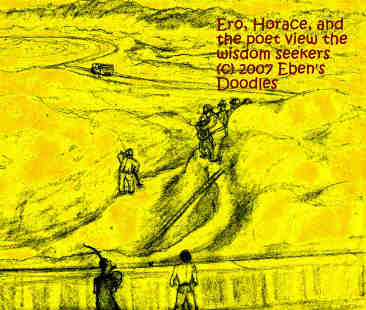
Amazed by the sight of all this digging, with an entire landscape burrowed through as by armies of giant gophers and moles, Ero wondered what they could have in mind. His guide could read Ero's expression and spoke for him, calling to the men,"Hello there! Yes, you! Would you fine gentlemen please explain to this visitor of our fair city why you are doing all this digging? And also please tell me where you put Tumwater? My wife and I have a home there--and I want to have this young fellow to join us for lunchy!"
The man in the trench dropped his shovel and spun around, his mouth open. The consultants too stopped consulting and stared at Ero and the poet wordlessly.
Stuart was not to be put off. He raised his voice, which was powerful enough, having been trained to reach the farthest person guffawing and shucking raw oysters for lunch in the last row of the upper gallery of any vaudeville hall.
"Yes, good man, please explain the reason for all this infernal digging, will you? We are on a nice, little constitutional, and happened to see you working here."
"What?" the trench-digger shouted back.
This response did not seem to satisfy Stuart the city's unofficial court jester-poet, and his expression showed it, echoed by his sidekick's sticking out his long green tongue again and rolling his eyes upwards.
The poet laureate of the unconventional leaned over the barricade to project his meaning a bit more easily. "I said, what are you doing? It is a civil question, and requires a civil reply, my good man, not 'what?'!"
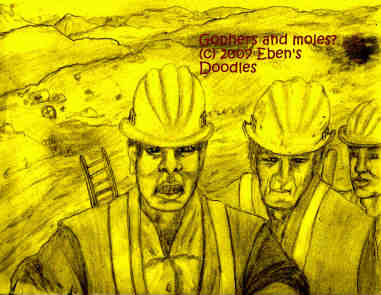
The man in the trench set aside his shovel and stepped forward toward Stuart. "Hey, what's your beef, mister?"
Stuart was not intimidated by this burly trench-digger. "No beef--no mutton or veal either!" he laughed, waving his spike a bit jauntily. "I just wanted to know what you're doing down there, that's all."
The worker seemed to realize something, then turned to the men with him, and they consulted. Then he came back after a few minutes.
"I'm to tell you we're doin' what we're doin', because we've been doin' it a long time, and..." Stuart waved the man's lame explanation aside. "Yes, yes, little Foxy Benedict and I can see that plainly enough with our four eyes! But WHY? That is the question! You're going in mindless circles. Nothing but circles! Can't you see that?"
Why? Why? That really threw the lifelong, professional excavators, and he turned to his fellow workers and supervisors for another huddle of consultation and advisement. He finally came back, as Stuart was drumming his long, green-painted nails on the barricade.
"Why?" he said. "Well, sir, we are seeking to be wise, that is the beginning and the end of it. We want to know the true way, and find a way out, to fulfill our lives, to get...to get wisdom! And we seem to have gotten lost somehow, and we're off-track, caught in a muddle we made ourselves."
Stuart seemed to be blown away for a moment by the man's honesty. Then his face filled with a big grin, and even the habitually morose Foxy Benedict grinned ear to ear, eyes filled with delight for the very first time.
"Don't you know anything, friend?" Stuart said, kindly as he could. The truth you seek, it begins with the fear of God. The fear of God--sober reverence--is the beginning of wisdom. Now that you have knowledge of the truth, proceed to wisdom, and finally understanding will dawn in your hearts and minds. That is the way to find fulfillment. There is no other way. I found wisdom that way myself. Foxy Benedict, I must confess, has a little attitude problem and still must work on it a bit more, but he's on his way, I can assure you."
The men must have heard him, and they stood speechless, soaking it in. They realized then, it appeared, that all their digging had been in the wrong places and in the wrong way. They needed to do it the way this stranger had just told them. Simple, hard-working men, they realized it was the plain truth, and they need just follow it up to get the result promised. They could do that! Yes, they could! For the first time, smiles broke on their weathered faces! They threw down their shovels, pulled off their hard hats and sent them sailing over the trenches and mounds they had spent their lives on, and climbed out of the excavations free men.
Seeing that his words had met with success, Stuart motioned to Horace and Ero, and they continued.
"I don't know what they've done with Tumwater. Our lunch is postponed, perhaps indefinitely, until I locate it. In the meantime, I will escort you back to your ship--the Argo of the illustrious Fifty Champions, I believe you said.
Off they walked toward the Capitol and the port.
They hadn't gone very far when a popup confronted them. The message beamed: "PRECEDING SCENE AND BIBLE LESSON COMPLIMENTS OF MRS. AND MISS FUNNEMARK, SAILORS REST HOUSE."
"Who are they?" the court-jester-wiseman wanted to know, not at all put off by the sight of the popup itself. "Oh, I met them in the city just beyond Point Defiance, Never-Never Land, and Ruston. Do you know it, sir?"
Stuart looked as if he were a bit confused, and Foxy Benedict looked just as confused, even with his eyes clamped shut. Suddenly, Foxy Benedict's eyes popped open. The name was on the tip of his long, green-tinged tongue--but it eluded him once again. Foxy Benedict's eyes closed, and Stuart sighed and shook his long-horned, neat head.
"No, but describe it for me--maybe then I'll remember."
They started walking again, taking a direct route through the regularly-laid out, modest neighborhoods of hundreds of houses that stood silent and seemingly uninhabited. They looked mostly all the same to Ero, and which Stuart knew hid the lives of the many people standing in them behind thick curtains and screens they would never penetrate or allow anyone else to penetrate to talk and reveal themselves heart-to-heart. Somehow, for such people, that was an unthinkable horror! They lived out lives of quiet desperation, as a poet had once described. Shallows were all they knew. and preferred. They clung hard for dear life like limpets and mussels and urchins and barnacles to rocks in the tide pools, never leaving--with the deep sea and its waves beating just a few feet away!
Yet Wally had made it easy to reach them!
It was strange, how solid and real the houses appeared, but Wally had not invested many bytes into them, for they were facades. Behind the fronts, nothing but the owners themselves! They were completely vulnerable, for the first time in their entire existence.
Yet there was no time for Ero and Stuart to take advantage of their vulnernability. They were safe to remain in the shallows of their tide pools forever!
Ero, who was one who could not remain in any safe, claustrophobic tide pool for very long, wondered where he should start describing the City of Destiny and the Funnemarks. Miss Funnemark has introducted for him the Three Doors. One was the World, the other the Flesh, and the third was Faith. He had experienced the first two, but Faith? Did it matter if he missed it or not? He hadn't found the Golden Fleece either. Instead he was prowling the City of Thieves, which now had a dead pachyderm-arachnid queen on its hands! Was that making progress? He still didn't have much to show for his shore-leave. It was time to cast-off and look elsewhere perhaps.
The free lance court jester-poet must have divined Ero's thoughts. "Yes, it's high time for you to sail on, laddie! This is the...ah, shall I say?--armpit of the South Sound you landed in, to tell you the truth! I've known that fact for many years, having been a journalist here working for the main fishwrapper--but when you consider other places, I might have done worse if we had moved, so we stayed. I retired, and we moved into our little bungalow in Tumwater to spend our sunset years, me and the good wife--then, things happened, good and bad as life goes--and lo, here I am, walking and talking with you! I don't have any idea what those men did with Tumwater, but I'll find it. Me and Foxy Benedict won't let a thing like that throw us."
"Yes, sir, I hope you find your wife--she's probably worried, I've kept you too long."
Stuart looked surprised, then a bit sad. "Oh, my wife? I seem to recall--yes, now I remember. She passed. Cancer. It was a very hard time for me, taking the losing of her, and her stay in the hospital too--I was pretty hard on the staff for not saving her like I thought they could have, if we had had the dough to spend on all the treatments!"
"I'm very sorry," Ero said, his sincerity plain in his eyes. He too had lost his chief joy in life--the chance to run for the Olympic gold. That too was a kind of death of a loved one.
Even now, it made his heart almost stop with pain that clamped on it. He had wanted that gold, that glory, so much! He couldn't even bear the thought of never again getting his chance at it!
Stuart patted Ero's shoulder. "Maybe it's just as well I don't remember much of it. And now I don't need to find Tumwater either. I must have been living in a pretty lonely doldrums without her. This is my walking papers signed and delivered, I see it now--my remembering she is gone has told me all I need to know to make my decision to cut the mooring line and launch forth. Why go back to old Tumwater? I think Foxy Benedict and I will just keep going down the road, and see where it takes us. I can always quote Shakespeare and some of my own poems and sing a tune and play a little on any piano on the premises to earn our bread and butter--and maybe a room in a B & B or a cheap hotel, or, failing anything respectable, a flophouse for 50 cents a night or the local Rescue Mission."
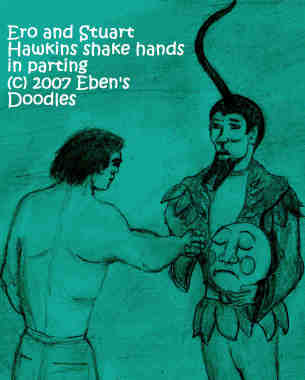
Stuart extended his hand. He shook Ero's. "So long, lad! You have a good heart. Best wishes on the road to the Door of Faith the Funnemarks told you about. I've given you a song, and you can sing it later when you find your next harp."
Before Ero could get over his surprise and ask him what he meant, Stuart and Foxy Benedict were off, walking jauntily away, heading north toward the City of Destiny.
Ero watched Stuart and Foxy Benedict turn a corner and vanish from his view.
"Now what?" he wondered. He had seen nothing but a lot of mishaps and bad things happen so far on the voyage and quest--would it continue that way? What was the point anyway? Why continue? Why not shuck it all and grab his knapsack and head out down the road like he had seen Stuart and Foxy Benedict just do?
Wally must have anticipated moments likes these would happen with the Cybernauts. He had prepared for second thoughts. A popup caught Ero's attention immediately with the message: "NO SAILOR LEARNS HIS CRAFT SAILING ON A SMOOTH SEA."
Ero understood the simple proverb, but he didn't find the message comforting, just the same. "So I have to put up with more storms and Black Ships and sharks and cannon balls!" he thought ruefully. "Why can't I just jump ship now and go find a more peaceful life than a sailor aboard the Argo will ever know? Why don't I have a choice? Or can I choose now and just tell the captain that I've had my belly full of problems and trials and want to try something different for a change?"
Wally had thought of this too, apparently, for the popup switched to the more somber message, which was in the form of a command: "QUESTOR PROCEED WITH THE SHIP TO TRIAL ISLAND IN THE NORTH SOUND."
"Oh, great!" Ero cried aloud. He sure didn't like the sound of that--"Trial Island", indeed!
Evenso, he continued walking down to the port, to see if the Blue Peter were flying.
It was! He was due on board!
Despite his former misgivings, the sailor in him, the Greek he could not deny, rose up, and he made for the ship, running. He was a man of the sea. He knew it with all his being. He could not jump ship--even if it had tempted him to think of doing it. The ship was in his blood, it flowed in his veins. He had to go with the Argo. It was his very existence and identity. Wherever the ship went, he was going with it--to whatever destiny lay ahead.
The faster he ran, the more his blood was racing in his heart and veins, the more excited he felt about his prospects, which had seemed so dark a moment before when he was debating the pros and cons of an Argonaut.
Life was good after all! Life was a journey, with dragons and wrecked ships and wicked kings and all the rest of it--but that made life worth living. Without the trials, what was life? A mashed potato sandwich!
No, he, Ero, wasn't going to wander in circles, digging trenches all his days, his nose in the dirt, never finding what he needed for fulfilment--as the diggers in Tumwater had been doing when Stuart and he had discovered them.
If he had not been asked, it did not matter now. He had made his choice--he was going on with this quest and voyage into the unknown! It was his destiny to make this venture--whether he found the Golden Fleece at the end of it or not. The going was the important thing, the risk and the pain and the difficulty made the prize at the end worth while. What if the Golden Fleece fell into his hand like an overripe plum, without his having to do anything or risk anything for it. What would it mean to him then? It would be just an overripe plum--soft, squishy, past its prime--and starting to spoil.
Thinking these noble thoughts, Ero reached the ship and made a mighty leap from the dock, catching the gunwales and tumbling into the already departing ship, which was a good fifteen feet out from the dock.
"Better late than never!" he said to his fellow mariners.
He was thrown an oar. The Captain was at the stern with Pieter already plying the rudder oars. The sail had caught the wind, and they were moving out into the searoad that would take them back up toward the Narrows and thence toward the North Sound.
Meanwhile, there was trouble brewing on the Black Ship. Because of it, they had missed catching Argo V when it left port at the City of Thieves. A nice fight, with all of them onboard, they could have wiped them out once and for all--and then the ship could have been scuttled. The Argo V--wiped off the gameboard! Next, please!
But it wasn't to be. The Black Ship had troubles enough of its own. Striker, for one, was thinking some rather mutinous thoughts of late.

Ever since the unpleasant moment when he first found himself onboard, in the company of thugs and convicts he felt nothing in common with and under the absolute authority of the ship's captain, he had been seething inside, trying to think of some way to escape and regain his freedom.
If he had to kill someone to get it, he wouldn't think twice about it.
But what was the best way to do it? When? He needed a plan. The captain, he learned soon enough, had thought of everything a sailor was capable of thinking up, and he was never given a free moment of his own, so that he could work on his plan.
No shore-leave, no breaks on the ship from their duties, it was all work and no play, and certainly no mutiny on the Bounty!
He was as good as a slave under this Captain Wolvewoeld! He hated it with all his capacity to hate, and then some, but it did him no good. Nothing was changed. He was still a slave, in shackles, serving a captain he hated--and feared a little too.
Striker kept his thoughts to himself, and knew he wouldn't succeed if he was too loose-tongued about them. Others were not so bright. They soon got found out and exposed by the captain. He had them tied up, whipped, even drawn and quartered, right on deck, as a lesson for the rest.
It was horrible, watching the men being cut to ribbons, just pieces of themselves--a leg here, an arm there, a head there! Blood everywhere...but the captain watched the whole proceeding, seated in a chair, obviously relishing the entire bloody scene of torture and beheading and dismemberment.
Everyone, included Striker, thought twice about crossing such a captain. Yet Striker couldn't stop thinking of possible ways to escape.
How he hated what had happened to him--his body, for instance. It was this flat thing, with the same functions of a man, but hands and feet that were black and iron-like-- not human at all. He could still breathe, eat, sleep, run, fight, but he was rolled out ridiculously flat like a playing card! What could have done this atrocity to him! He had been normal one moment--croaking for water in some desert somewhere, his legs broken by a bad fall--and then here he was, onboard the ship with a crew of flat-bodied pirates! He hated every one of them--particularly the detestable blood sucker, Clarence, who had shown up on the ship with him, almost at the same time.
There were some other Wolverton "graduates", he saw. These gave him some hope that he could carry out his escape. He could use them somehow, and Clarence would serve as the stooge, to divert the captain's attention, while he got clean away.
The only problem was that, with working guard duty in shifts back to back, he was given no opportunity to talk long enough with any of the Wolvertons, Clarence included, to get the first part of the plan going. He had to get Clarence's trust too--if he was going to be fooled into being their stooge.
But for all this Striker needed time and opportunity. If only the captain would give them shoreleave again. It was rare, but not out of the question.
Striker decided he would wait, and not try anything that the captain would think suspicious. "I'll just act as loyal and obedient as possible, and wait for my opportunity. There has to come a moment when I can get alone with Clarence and the other Wolvertons." So he thought, meanwhile keeping an eye on Kim Philby, who was a stool pigeon for the captain, keeping the crew under his gimlet eye, even while he was preying on some of them with his evil, roving hands.
"If that buggar tries anything just once on me," vowed Striker, gripping his oar hard, "I'll brain him and throw him overboard to the giant octopussies! They'll munch on him like a cracker!"
Striker meant it, and Kim Philby, the captain's chief aide, must have sensed danger, for he kept clear of Striker, while constantly bothering others in the crew, including some of the Wolvertons, not excluding Clarence.
The Argo V continued up the channels and the most direct northerly sea road, and not encountering any sign of the Black Ship, sailed in full sight for once. It was the night that was most dangerous, to be out on the water. The Black Ship was notorious for night attacks whenever there was no moon. In daylight they had a fifty-fifty chance, at least, to beat them off, though they had lost ten of their number. Yet in the Sound, the days were longer, due to the reflection off the water of the light in the sky. They could sail well into the evening and still see. Unfortunately, all of them missed the lure the pirates had attached to the stern--a sure draw for the dreaded octopussy, which Captain Wolvewoeld had trained to come for human food at the sight of it.
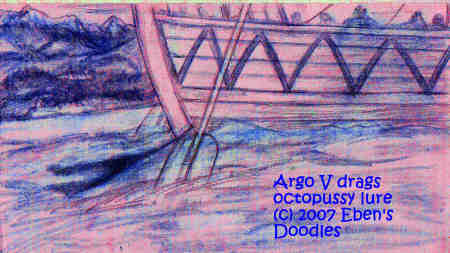
The Black Ship, unknown to Captain Pikkard, had also lost some crew--due to the executions of those the captain thought were considering mutiny and desertion. They were down fifteen in crew. That had weakened them considerably, since there wasn't one of them that was the full equal of a Argonaut. Only Captain Wolvewoeld's experience and superior strategy and knowledge of the Sound make them almost unbeatable.
Captain Pikkard stood, watching his ship's progress, wondering whether the opposing captain woulld permit them to pass to Trial Island without a fight at sea?
He had, he knew, one cannonball left. Would he hold it in reserve for the coup de gras? They could first attack with their swords, then finish their ship off with a final cannon shot? Back in the water, any Argonaut who survived would be caught by the sharks.
"Well," Captain Pikkard thought, "we can't stay forever in port, with the men safe on shoreleave looking for the Fleece. I guess the reason he doesn't let his men go ashore is he can't trust the whole lot of them not to desert. That is his chief weakness--he holds them by brute force alone. But we can't avoid him forever anyway. We have to sail--we have to launch forth! Despite whatever he throws at us, we have to go in search out the Golden Fleece, wherever it is!
Captain Wolvewoeld knows this fact about us, no doubt, and so doesn't mind how long we spend on shoreleave, tied up at port. He's good at waiting for the right moment and right situation to pounce. He's a master pirate--an expert at piracy!"
Captain Pikkard looked both north and south, east and west. The islands and waters, the breeze that filled the sail, it was seemingly so peaceful, but the peace was deceptive. Out there somewhere was Captain Wolvewoeld and the pirate ship, equipped and primed to attack them when they were at their weakest and most unsuspecting. That could be counted on! When? Just where? That could not be known, until it actually happened. All he could do for his Argonauts, his brave and courageous crew, was to try to anticipate the times and places where they were most vulnerable and, thus, the sites where Captain Wolvewoeld was most likely to spring upon him, fangs and claws bared.
Captain Pikkard, despite his vigilance, continued his thoughts. He wondered what "Trial Island" was all about. He had never heard of it. It was in the North Sound, that was all he knew. And there was a king ruling there, in some kind of castle. The popup, as usual, had been terse, not overly informative. A couple pictures of Trial Island, and the king and his daughter too, flashed briefly on the screen.
Trial Island was certainly mountainous, and the castle, it looked quite Bavarian in its Alpine setting. All those towers and chimneys! It must have hundreds of rooms too--with stone staircases, stone halls, stone bedrooms, stone sculleries and dungeons--stone everything. Cold, drafty, vast, gloomy--it was going to be an interesting place to visit--and tour--if the king proved friendly enough and invited them, that is.

As for the king and his daughter, Captain Pikkard observed on seeing the picture of them on the popup, his first, strong impression was the elaborate, archaic, medieval look of the household, but though this king was old, he still looked full of regal stuffing. He seemed a real king, in other words, one who intended to rule his subjects without any interference or back-talk, as kings once did in bygone kingdoms before the modern world came about and threw out kings and castles and knights in armor jousting on horses with long lances for the garters of lady loves. How would the Argonauts and their Quest of the Golden Fleece fare with such an aged tyrant? Captain Pikkard had to wonder. He knew he was no Sir Launcelot. With his game leg and awkwardness, he couldn't ride a horse, much less take part in a jousting match to save his life! What could he do that would gain the favor or trust of this Hapsburgian-nosed monarch in the popup's screen? What sort of "trial" would their host inflict on them as a price for his help in finding the Golden Fleece? It remained--alas!--to be seen what it would be. They would just have to take whatever fell their lot--and make the best of it! As for the king's pretty, young daughter, her expression was telling. She looked none too pleased with whatever her father was saying. What could it have been? Captain Pikkard wondered.
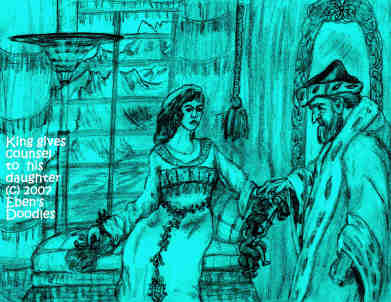
He did not have much time to think about it. Captain Wolvewoeld had given the White Ship some free time from fighting for its survival--but feeling he was in control of his crew, he sent out raiders, who were in his opinion expendable, because they were the most complaining among the crew.
The boat the raiders used got close enough to the White Ship to catch it as it rounded a headland where Captain Wolvewoeld knew in advance it had to pass. The pirates, led by Striker, threw a grappling hook and rope and quickly scrambled up it and began hacking away with their long scimitars. But Captain Pikkard was always watching most keenly whenenver they rounded headlands and capes where the Black Ship liked to hide in wait for them. The White Ship was ready for the attack. They quickly beat back the pirates and threw them overboard.
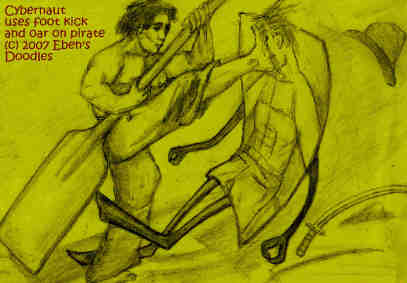
Taking them prisoner was impossible--there was no where to keep them securely onboard the cramped, narrow White Ship under constant guard. As the Cybernauts watched, several swam to their dingy and climbed in, saving their lives. Captain Pikkard knew there was no way to save these attackers, who would only find opportunity to betray them to Captain Wolvewoeld the first chance they got. But before the boat could get away, tentacles reached out, capsizing it and pulling each of the struggling, screaming pirates down under the water.
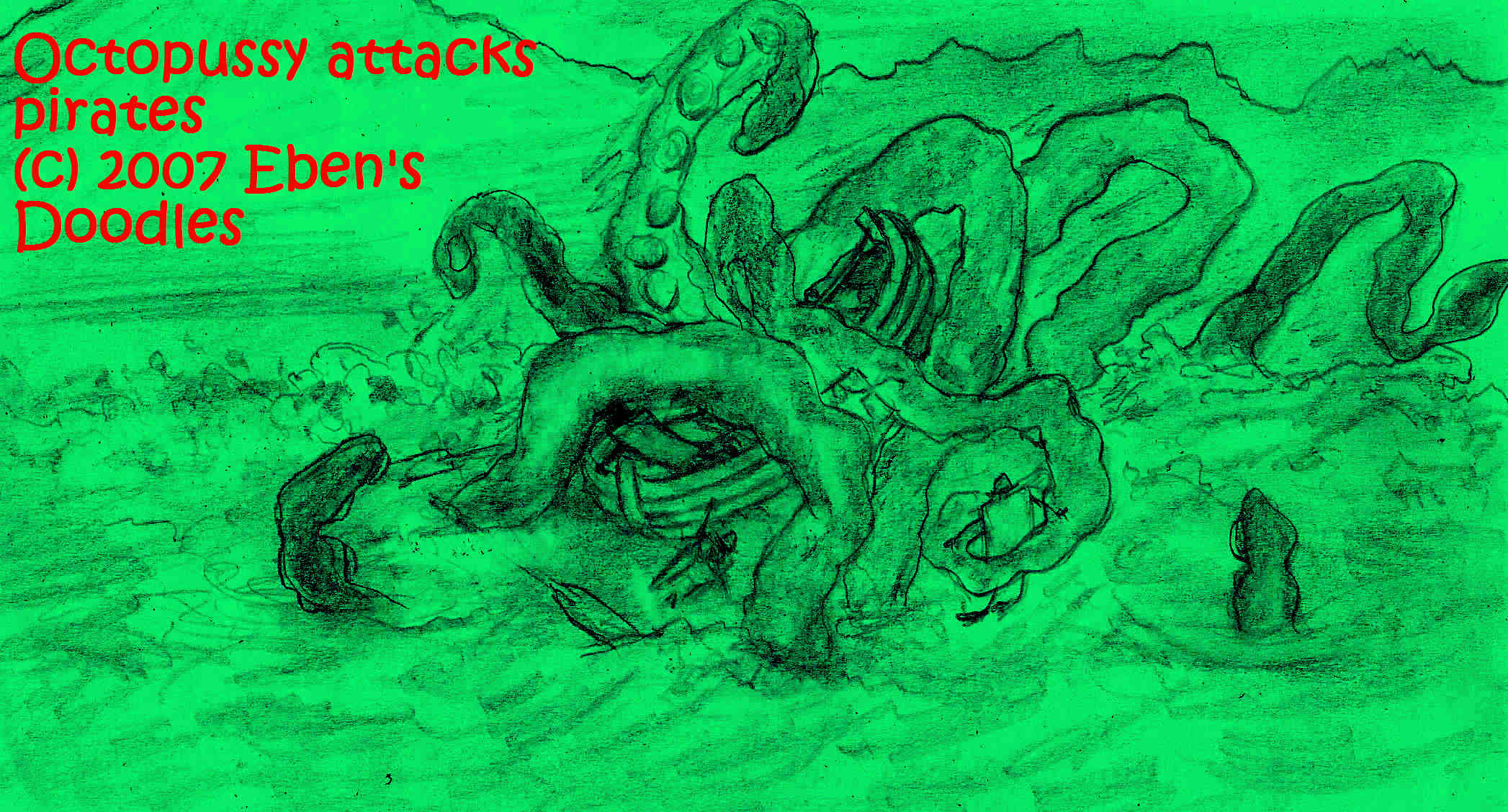
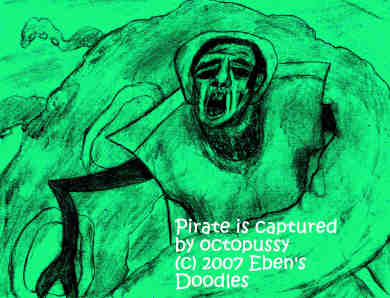
A while later, when the men were settled down again, the sail carrying them swiftly northward, Ero, on his break, brought out his replacement for his lost instrument, another guitar! He decided to try it out anyway. He began picking at the chords of an old Greek song.
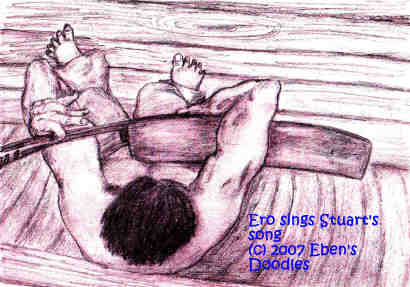
But the song would not work on the guitar, for some reason, and the strings sounded tinny. Adjusting the tuning did no good and only made it worse. He was about to set the guitar down when his fingers hit a new chord that sounded clear and true like a bell. He did it again, and the sound was so beautiful, he continued strumming, and though it was random, he sensed his fingers were being guided somehow. And words came to his mind, calypso-fashion. Yet as he began humming and then singing the words, he realized this must be Stuart's song that he had promised.
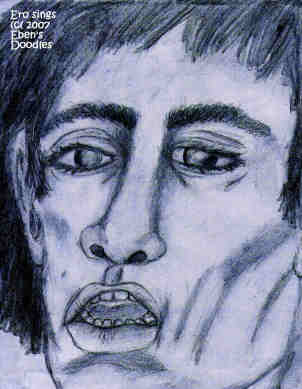
It won't be my fortune, it won't be my fame
It won't be my friends or my family name
If it won't be these things then what will it be
It's just between my Maker and me...
You can't use your power, you can't use your pride
You can't use possessions so cast them aside
If you can't use these things then what can you do
It's just between your Saviour and you...
The far away trumpet will echo shrill
From valley to valley and hill to hill
And the eyes that raise in dark dismay
Will cry, "Oh Lord, it's the judgment day."...
We can't bring our castles for him to behold
We can't bring our treasures of silver and gold
If we can't bring these things then what can we bring
There's just a cross, to this we can cling
The Argonauts enjoyed the song, though it was written to provide food for thought rather than passing entertainment. Before they finished commenting on it, Pieter cut them short.
"What was that rubbish you just sang, oarsman? That's a silly Jack Dutch song, if I ever heard one! Why don't you sing proper Dutch songs that have some real backbone to them? Here, I have one for you. All you need is a tune to do it justice."
Not noticing that the men had quickly shuffled away, Pieter stuck his chest out, and boomed away at the verses of his song with a somewhat nasal tenor.
Our Good Ship Argo sails again
We killed a dragon, and some men
We proved we're strong, and have some pride
We're never one to run and hide
So step aside as we win fame
The world will learn to know our name
Heroes all, real champions
We've proven that we're Jason's sons!
It was awful--so awful, it was awesome. Even Fast Lucie sounded like a nightengale in comparison singing her theme song, "When the Red, Red Robbin Comes Bob-Bob-Bobbin' Along!"
Embarrassed for the helmsman, Ero smiled gamely, then put the guitar away as discreetly as he could.
"Aren't you going to try it?" Pieter protested, his bloodless, bluish Dutch cheeks flushing red. "I bet you never heard lyrics as good, Meinheer. I composed them myself!"
Having heard and seen what was going on, Captain Pikkard intervened, calling Pieter back to him, just to spare his musician further pain.
"I really didn't know you were a composer," remarked the captain to his helmsman.
Pieter's eyes shone. "Thank you, Meinheer! It is an excellent piece, is it not? I don't think anyone could have done better! I mean to learn it myself on the guitar, and sing again it to the crew when you call them all together for a special treat! When they hear it several times, they will appreciate it all the more! The first time through it only breaks the ice!"
Captain Pikkard's face registered both shock and concern.
"Well, Pieter, your duties are too demanding at present, don't you think? I mean, when the voyage is completed, then there will be plenty time for that much music. You can work all you like on it then."
Pieter stared at the captain. His face darkened. "Meinheer, you don't like it, do you? It's a hundred times better than that driveling, stupid, sentimental, Jack Dutch song Ero sang!"
"But I don't mean to say it isn't good," replied the captain lamely. "It's just maybe not the best time for it now."
The disclaimer came too late to do anything to help the situation. Pieter was hurt and angry, by his looks, and he stomped away like an offended child.
Shaking his head, the captain gazed after him. Pieter, he observed, was getting harder and harder to please and guide the right way. How could he get this thick-skulled, young Dutchman to consider higher things than the trivial distractions he had always thought important? And what if he couldn't? What then? He needed a helmsman he could depend upon in every storm and difficult stretch of the voyage.
Captain Pikkard soon had other things to be concerned about. Unknown to him and the crew, the lure the pirates, before they were gobbled up, had tacked on to the stern had worked. Trained to follow it for special treats like unwanted nuisances, pirates Captain Wolvewoeld had chosen to get rid of, the giant Octopussy, queen of the Sound, had followed it long enough to build up a tremendous appetite. When she was ravenous enough, she struck. In seconds, the air was full of flailing tentacles, all reaching inboard to pluck off unwary Argonauts which soon served as taste snacks, albeit a bit full of bones.
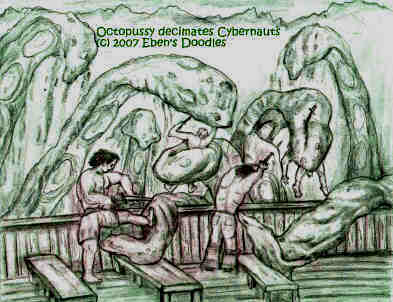
The men fought back with great courage and ferocity, but their swords merely irritated the Octopussy, which felt the stabs like mere pinpricks. It seemed unbeatable, as one Argonaut after another was pulled off the ship and stuck down into the monster's gullet, after being ripped into manageable chunks with its huge, slashing beak. The screams of the men--it was horrible beyond belief, and Captain Pikkard and those with him who were fighting for their lives could do nothing to save their comrades once they were lifted off the deck by the sucker-armed tentacles.
Suddenly, the grasping arms all drew back and sank into the dark water out of sight.
The gasping survivors looked over the side, wondering what had happened.
"Quick, help me with the cannon!" shouted the captain, who knew there was no time to waste. They all ran to pull the ship's cannon out and set it up, lifting it up to the bow and sticking its snout through the rudder oar hole.
Suddenly, as the captain thought might happen, the Octopussy rose up out of the waters like a volcano had come to life. Spray and flailing arms going in all directions, the sea erupted all around her as she moved, bodily, toward the ship. Evidently, she thought them no threat at all, and need not hide herself.
The captain, however, working furiously with his men, were prepared. The gunpowder was stuffed in, and then the ball was loaded, and the captain stuck one of his wooden matches on his britches and lit the fuse he had set in place. It was none too soon. The Octopussy was charging the ship, intending to climb aboard and finish her meal when the cannon fired, leaping backwards, and covering them all with smoke clouds.
It has worked--perfectly. The ball sped toward its charging target--a bull's eye so big it could not possibly miss...

In another second or so the twenty pound ball of solid iron smashed right into the center of the monster's brains, continuing on to penetrate and exit a number of vital organs as well in the rest of the sacklike body. Its brain it could manage to repair, given time, but not its heart and liver. It could lose any tentacle and grow another from its stump--that was the least of its injuries. But with a shot right through its vitals, the game was over for her, and she was dying a slow, agonizing death. Turning belly to the sky, the Octopussy was not going to give up the ghost without a struggle. Raging against the dying of the light, it made the Sound seethe, sending waves out with its thrashing tentacles that threatened to capsize the Argo.
The sight was spellbinding to the Cybernauts--they forgot their dead comrades for the moment as they watched the spectacle of the dying monster. The horror in its eyes, as it turned and gazed upon them was not pitiful but something they were glad to see, after what it had done to them. The arms grew weaker, the body slumped lower and lower into the water, its eyes grew glassy. It began making sounds for the first time. A tiny but audible human voice reached the Argonauts' startled ears: "Help me! Help me! I'm drowning! Bad men hurt me! Help me!"
It was so pathetic. But it disgusted the Argonauts, who were now beginning to grieve for their lost comrades, over ten of them missing and no doubt inside the stomach of the monster churning the water and turning slowly over in the water from side to side, as its blood poured out the hole in its head.
"Good riddance!" Captain Pikkard shouted at it, though the Octopussy probably could not hear anything now or understand human speech.
But the Octopussy was not through speaking. "Don't you know me? I'm Hettie Green! I am rich! Rich! I have millions invested on Wall Street and in the banks and factories and tenements>"
"What?" Captain Pikkard burst out. He thought, and then he recalled that he knew of her. She had been a big Wall Street investor in the 1900s, living homeless in a broken down carriage in somebody's back yard just to save rent money, wearing borrowed newspapers for underwear, and when she died a seeming pauper they found she had forty million dollars (and that was just the amount she let people find).
"The wretched, greedy old miser!" Captain Pikkard cried out. How in the world had Wally come up with her miserable DNA--he was a veritable wizard! However he had got it, she had made a terrific octopus--her true nature--grasping, greedy, ravenous, in animal form!
But oh! he thought, what losses she had inflicted on his crew. He went through the nmes of the men--and could hardly bear making the tally.
The survivors stood looking at each other, giving the sinking monster, which was still crying out its name in a little, old woman's voice, and Captain Pikkard knew what was going on their minds. What was he to do now? There sorrow and loss was so great, what could he do for them? Did the Quest matter anymore--after the terrible deaths of their many comrades?
At this moment the popup intervened. Turning his eyes toward it with a great effort, Captain Pikkard at first had a hard time grasping what it was saying, he was struggling with so much shock and grief of his own, now that the calamity had had time to really sink in.
"Quest is not sustainable with present numbers," the popup declared. "Request that representative be sent for advisement to the game's central programming center."
"A representative for the ship?" the captain repeated, stroking his jaw. It didn't say the skipper was needed, just a representative. Who would be best, if he were not to do it? Immediately, though he had reservations before, Ero came to mind. He had seen how he had fought off tentacle after tentacle, putting himself in harm's way, just to help his comrades, even though it was hopeless once they were suckered.
Ero would be his choice! Ero stepped forward as the captain called him out.
"I want you to represent us at the place called Central Programming. Whatever that is, you will soon find out. Will you accept the assignment, musician and oarsman?"
Ero did not hesitate. "I will do anything, sir, if it will help.
Pieter stepped forward. "But Meinheer, you're not going to send him, are you?" "Helmsman!" the captain stopped him with a stern voice that startled the whole crew, who had not heard it used before.
Pieter did stop abruptly, and turned pale at the gills.
"One more word, Helmsman, and you will be relieved from duty and spend the next day in detention! Any question?"
Pieter shook his blond Dutch head, then lowered his eyes in anger and embarrassment.
But there was important business to be done, and the popup continued.
"Respresentative Ero, step to the bow immediately. You will be transferred temporarily to Central Programming."
Ero ran to the bow and stood at attention. A second later, the remaining crew and their captain saw him turn into a bluish haze and then vanish into thin air.
What was it all about? So many comrades lost in the battle with the giant octopus, and now Ero gone who knows where.
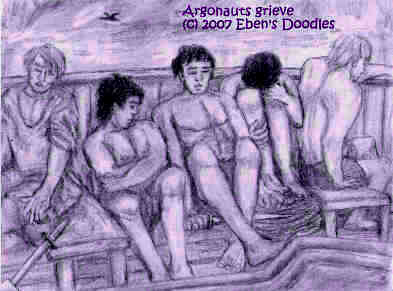
The men were bewildered and dismayed. Captain Pikkard turned to the crew, to reassure them if he could.
"We have suffered terribly this day," he began, but he could not continue for a few moments. Then he began again. "We cannot bring our comrades back. But grieve for them, and we will do justice to their memory when we go ashore. As soon as we can reach a safe haven, where the Black Ship won't have the advantage of surprise over us--we can build a fitting memorial to them. Do you want to do that?"
The men glanced at each other, and one by one they nodded.
"I don't now what our Representative will be told or shown. We'll have to wait for that, and it is useless to speculate. Perhaps, the matter isn't settled until he is interviewed first. That is my best guess. At any rate, we have this ship to save from another attack we cannot hope to survive as we are; so we must get ready to move. These waters are dangerous, even with the monster dead. Our comrades would want us not quit here but go on."
It was a sad group, despite his best explanations and most gentle handling. Yet they drew together, managing to move about the ship again, filling in places if they could that had been those of lost comrades.
They went back to the business of sailing. The ship moved toward the nearest island, wisely keeping out of range of any covering headland or big sea rocks.
As for Ero, he found himself standing in what looked like another realm--vast, dark, yet glowing with color.
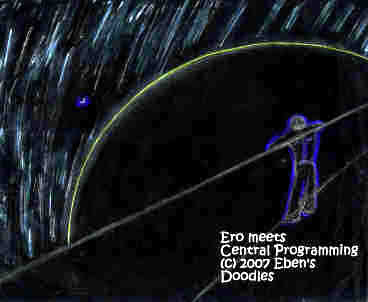
His eyes adjusting, he leaned over a restraining wall and saw a huge, pearl-like object. Off to one side there glowed something, blue like himself. What could that be? It looked a lot like the lookout. Was it Horace? How did he get to be a Representative? What was going on? How could that big-winged bug represent the Argo? That took a real man!
He was still wondering what Horace was doing there when the the pearl-like Central Programming unit greeted him. "Welcome, Representative Anteros Perseus Theotocupouli, WUSPF44560000000021000000000012A."
First, let me put your situation to you. You have reached, with the loss of crew members, a critical mass--and cannot continue with the loss of morale you are suffering. Your opponents can continue as they have done--even with their losses, but yours are too great to sustain. You have lost nearly fifty per cent. What should you do? You can terminate your quest now, or continue and suffer a final attack and defeat. Will you terminate? Or will you continue the Quest, which is hopeless."
The CP unit went on, giving its disclaimer, which Ero was in no frame of mind at the moment to give much attention to: "This unit is not autonomous as a programming function, under the protocol and guidelines of the sub-subfile programmer. A Back-up NTM is being held in reserve. Respresentative chosen is allowed to terminate or re-activate program game. CP unit will terminate itself when game is re-activated or terminated, and will no longer be available to gameplayers. Special instructions, or Help, will be given gameplayers as before, when needed. Is this understood completely by Representative. If Respresentative does not reply in five seconds, the unit will proceed with the termination, or re-activation dependent upon the Representative's choice."
Ero's thoughts were whirling in those last few seconds left to him. He thought fast. Quit now? They had come so far--the Fleece was almost within grasp! Yes, it was true--they were few in numbers, but he knew, in his heart, that his captain could not quit, unless it were for the sake of his men. As for himself, he did not have to question it. He would rather be terminated than quit.
"Well?" prompted Central Programming promptly, a bell sounding.
Ero was ready! He had an answer anyway.
"I know what the captain would do, and I know what I want--but I am not sure my comrades will feel the same way. Perhaps they want to turn back and drop out of the Quest.
"That is not logical, Representative. They chose you to represent them. Whatever you decide, that is what they will accept, since they let you speak for them."
"All right! I will choose! We will go on!"
There was a pause, as Central Programming's pearl-body seemed to come alive with trillions of computations and symbolic code for the re-activation of the Game.
A bell-like sound and images flashed before Ero.
Ero stared at each, and after he had seen five individuals, the bell sounded again.
"Representative, your Quest is restored to active mode, and you are granted five possible pathfinders, or Questors. This is being given you by the Sub-subfile Programmer because it is a test of your morale quotient, or whether you are really committed to playing the Game, and winning the Golden Fleece. You must be tested. When you understand and are ready, signify by pressing the spacebar.
A giant spacebar in the shape of an oar appeared, dangling in space. It moved to Ero, and he pressed it with both hands.
The bell tone sounded. "Five Questors, or Pathfinders, have been shown to you. To make the test challenging, they are not directly of your Greek culture and heritage, yet they all drew from Greece and could not have achieved what they did without the ancient Greeks' contributions. Their names are Marian Anderson, Benjamin Franklin, Ezra Meeker, David Wilkerson, and Eric Liddell. They are, respectively, a singer, political leader, pioneer-farmer, pastor, and Olympic runner and Gold Medalist. Which one is best suited to go on the sail of your ship? You may take your time to consider them, but when the bell sounds twice, please answer."
The biographical details for each are given in the popup, and you may review them all before making your choice." A popup appeared before Ero, and he saw the first Questor-Pathfinder pictured--Marian Anderson. Her life was detailed for him. When he finished hers, he reviewed each of the others. As he came to Eric Liddell, he was really struggling. A Gold Medalist runner featured in a film called "Chariots of Fire"! He read the glorious credits of the Scotsman, and they thrilled him to the core though the image was, due to some glitch in Central Programming, missing. Surely, this man should go on the sail! He knew he would love it, even if his comrades might not share his enthusiasm to the same degree. Just as he thought he was ready, he felt something was missing. What was it? He wanted Eric Liddell with all his heart, and could not think of anyone better suited for the honor of decorating the Argo's mainsail, but yet, something was not quite right. What could it be?
A bell-tone sounded.
Ero began to sweat. What could he say or choose--he was not totally sure he should choose Eric, though he badly wanted to. He flicked rapidly through the five Pathfinders.
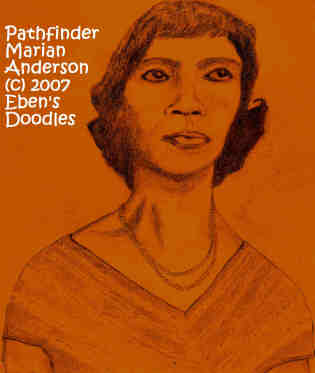
Marian Anderson won stardom and world-wide fame without compromising herself in any way. She battled racial prejudice and the poverty of her long-enslaved and newly freed black people, with despair always tugging at anyone from her people who tried to climb up out of the plantation mind-set, which made people lifelong victims, full of resentment, frustration, and hatred for their former masters, the whites. This doomed other young black girls from the start who chose to sell their bodies or give up their dreams, but Marian Anderson took a different route and triumphed, working with her faith in God and her wonderful voice, which Toscanini called a voice that appears once in a century. It took much training and dedication, but she climbed all the way to Carnegie Hall status despite all that her enemies tried to do to stop her. She was even chosen to represent her country at the United Nations. She was one of the greatest women in history, because she chose faith, hard work, and love of people, which conquered all the unforgiveness in her she might have given in to and all else that stood in her way to true greatness.
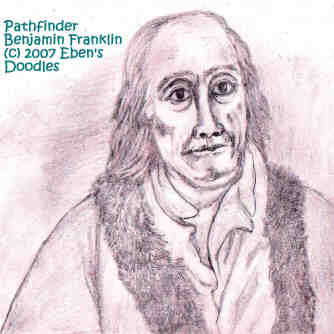
Benjamin Franklin? He was a poor but industrious young man who worked very hard, taught himself, became a printer, and a publisher, and with a cheerful attitude judged no difficulty too great to take on and master. He became a scientist, inventor, educator, and political leader, writer, and a philosopher, and humorist full of practical proverbs for improving oneself. All the world learned his name and recited his witty sayings. He was also known for his wisdom and great knowledge of government and men--well able to speak man to man with kings, princes, and the rich and win their respect and even their following. He rose to becoming one the inner circle Founders of a brand-new, experiment of a nation, the United States of America, arguably the greatest free nation ever known on earth.
Thanks to his trip to the Tipi of the Harps, Ero already knew something about Ezra too that made him think this man would make a great symbol or banner emblem. He could not forget how Ezra tended his oxen when they fell sick on the trail, and how terribly their deaths hurt him.
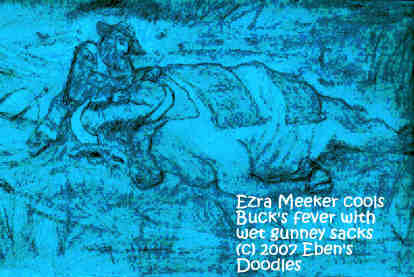
But the bio contained some more details he didn't know before, all fascinating. This man, who began as a poor farmer and pioneer, worked hard, used his wits to improve his farm, and ended up taking his wife to England to the Court of Queen Victoria on invitation! His chief love, however, was the Oregon Trail and the heroism of the pioneers who blazed it. As if it branded his soul, he championed the Oregon Trail, crossing and recrossing it, the only man to do it by wagon, car, and plane. He got President Theodore Roosevelt's approval for his project to erect memorials all along the route from St. Louis to Oregon on the Columbia--the same president who founded the National Parks, the first of their kind in the world. The pioneer was also befriended by the great industrialist Henry Ford, who built a covered wagon type-car for him to use in retracing the Oregon Trail.
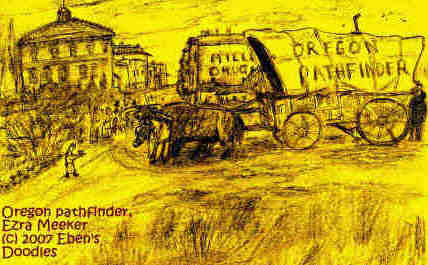
Considering the next man--David Wilkerson--Ero learned that this man was a pastor, who came to New York City as a country yokel to a big, sophisticated city where human life was cheap and big money ruled in the penthouse and the dirtiest alleys behind the gleaming skyscrapers. He was not deterred.
He took on the switch-blading, bloodthirsty gangs of the city that even the NYPD feared to take on, and they came to faith in his Savior and Lord, Jesus, even though he was beaten up badly by the leader of one of the worst gangs, a Puerto Rican named Nicky Cruz who was the brutalized son of a warlock and witch who beat him continually as a little boy, and left him naked, covered in his own blood. Later on, Wilkerson went back to the heart of the Big Apple, rotten as it was, and founded Times Square Church, creating an alternative for broken lives where there was only X-rated theaters, porn shops, and drugs.
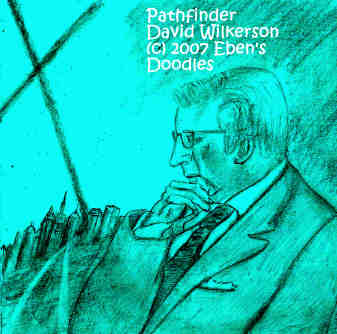
It flourished, and the whole sleazy Times Square area changed and was revitalized. He brought hope to the heart of a hopeless urban jungle. He could have stayed in the country, and been comfortable in a less-demanding church and parish--but he chose to invade the heart of darkness with the light of his gospel. This man, a pastor, full of faith, and fearless, able to accept suffering and even death for what he believed was the cure for the world's sickness and warfare, was a great, great leader and Pathfinder.
Eric was a man of great principle, however. He would refuse the advice of the Prince of Wales (representing his own country, Great Britain, at the Olympics) and give up a crucial race in his medley of races, rather than race on Sunday at the Olympics. He was the world's greatest runner, many thought, but he would not compromise his faith for even Olympic gold and his country's highest honors. He left Scotland, his home, and went to China as a missionary. He died in a Japanese internment camp in World War II, after running in competitions for the sake of promoting the morale of his fellow prisoners. His story was one that every runner had to admire--the man possessed greatness, courage, self-sacrifice, and love of others that was strong to the bitter end. Coming from Seriphos, the island where the hero Perseus, who killed the Gorgon, had landed in a floating chest where his mother Danae had put him to save his life, it was almost a foregone conclusion for Ero. What red-blooded Greek, with the blood of Perseus, Jason, Achilles, and the very first marathon runner hot in his veins, would not choose such a champion as Eric Liddell, even if he was Scotch and not Greek?
Yet something was tugging at him from another direction. Ero was really torn between Eric and--who?
The second and last bell-tone sounded. "Is the Representative ready to choose?"



Retro Star Directory and Linking Page

(c) 2007, Butterfly Productions, All Rights Reserved

